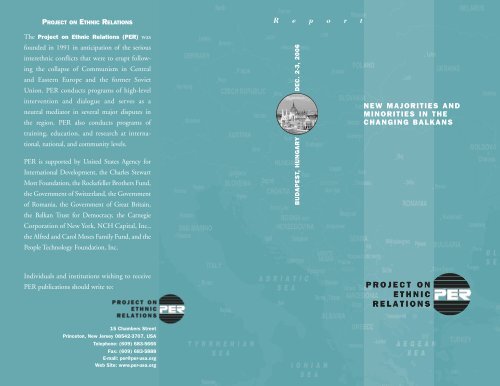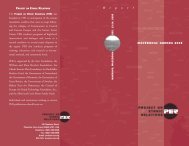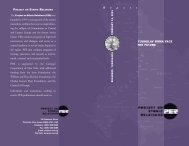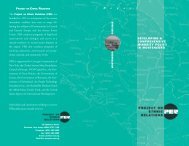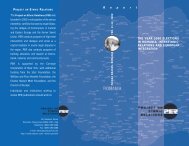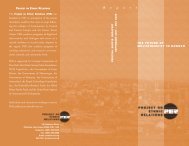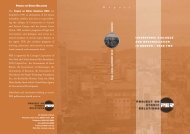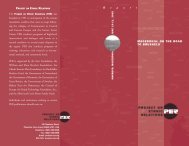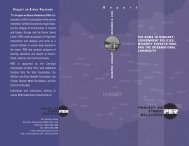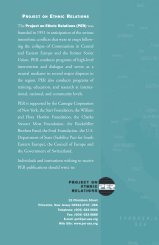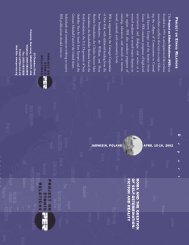New Majorities and Minorities in the Changing Balkans - Project on ...
New Majorities and Minorities in the Changing Balkans - Project on ...
New Majorities and Minorities in the Changing Balkans - Project on ...
Create successful ePaper yourself
Turn your PDF publications into a flip-book with our unique Google optimized e-Paper software.
PROJECT ON ETHNIC RELATIONSR e p o r tThe <str<strong>on</strong>g>Project</str<strong>on</strong>g> <strong>on</strong> Ethnic Relati<strong>on</strong>s (PER) wasfounded <str<strong>on</strong>g>in</str<strong>on</strong>g> 1991 <str<strong>on</strong>g>in</str<strong>on</strong>g> anticipati<strong>on</strong> of <str<strong>on</strong>g>the</str<strong>on</strong>g> serious<str<strong>on</strong>g>in</str<strong>on</strong>g>terethnic c<strong>on</strong>flicts that were to erupt follow<str<strong>on</strong>g>in</str<strong>on</strong>g>g<str<strong>on</strong>g>the</str<strong>on</strong>g> collapse of Communism <str<strong>on</strong>g>in</str<strong>on</strong>g> Central<str<strong>on</strong>g>and</str<strong>on</strong>g> Eastern Europe <str<strong>on</strong>g>and</str<strong>on</strong>g> <str<strong>on</strong>g>the</str<strong>on</strong>g> former SovietUni<strong>on</strong>. PER c<strong>on</strong>ducts programs of high-level<str<strong>on</strong>g>in</str<strong>on</strong>g>terventi<strong>on</strong> <str<strong>on</strong>g>and</str<strong>on</strong>g> dialogue <str<strong>on</strong>g>and</str<strong>on</strong>g> serves as aneutral mediator <str<strong>on</strong>g>in</str<strong>on</strong>g> several major disputes <str<strong>on</strong>g>in</str<strong>on</strong>g><str<strong>on</strong>g>the</str<strong>on</strong>g> regi<strong>on</strong>. PER also c<strong>on</strong>ducts programs oftra<str<strong>on</strong>g>in</str<strong>on</strong>g><str<strong>on</strong>g>in</str<strong>on</strong>g>g, educati<strong>on</strong>, <str<strong>on</strong>g>and</str<strong>on</strong>g> research at <str<strong>on</strong>g>in</str<strong>on</strong>g>ternati<strong>on</strong>al,nati<strong>on</strong>al, <str<strong>on</strong>g>and</str<strong>on</strong>g> community levels.PER is supported by United States Agency forInternati<strong>on</strong>al Development, <str<strong>on</strong>g>the</str<strong>on</strong>g> Charles StewartMott Foundati<strong>on</strong>, <str<strong>on</strong>g>the</str<strong>on</strong>g> Rockefeller Bro<str<strong>on</strong>g>the</str<strong>on</strong>g>rs Fund,<str<strong>on</strong>g>the</str<strong>on</strong>g> Government of Switzerl<str<strong>on</strong>g>and</str<strong>on</strong>g>, <str<strong>on</strong>g>the</str<strong>on</strong>g> Governmentof Romania, <str<strong>on</strong>g>the</str<strong>on</strong>g> Government of Great Brita<str<strong>on</strong>g>in</str<strong>on</strong>g>,<str<strong>on</strong>g>the</str<strong>on</strong>g> Balkan Trust for Democracy, <str<strong>on</strong>g>the</str<strong>on</strong>g> CarnegieCorporati<strong>on</strong> of <str<strong>on</strong>g>New</str<strong>on</strong>g> York, NCH Capital, Inc.,<str<strong>on</strong>g>the</str<strong>on</strong>g> Alfred <str<strong>on</strong>g>and</str<strong>on</strong>g> Carol Moses Family Fund, <str<strong>on</strong>g>and</str<strong>on</strong>g> <str<strong>on</strong>g>the</str<strong>on</strong>g>People Technology Foundati<strong>on</strong>, Inc.BUDAPEST, HUNGARY DEC. 2-3, 2006NEW MAJORITIES ANDMINORITIES IN THECHANGING BALKANSIndividuals <str<strong>on</strong>g>and</str<strong>on</strong>g> <str<strong>on</strong>g>in</str<strong>on</strong>g>stituti<strong>on</strong>s wish<str<strong>on</strong>g>in</str<strong>on</strong>g>g to receivePER publicati<strong>on</strong>s should write to:15 Chambers StreetPr<str<strong>on</strong>g>in</str<strong>on</strong>g>cet<strong>on</strong>, <str<strong>on</strong>g>New</str<strong>on</strong>g> Jersey 08542-3707, USATeleph<strong>on</strong>e: (609) 683-5666Fax: (609) 683-5888E-mail: per@per-usa.orgWeb Site: www.per-usa.org
NEW MAJORITIES ANDMINORITIES IN THECHANGING BALKANSBUDAPEST, HUNGARYDECEMBER 2-3, 2006© Copyright 2007 by <str<strong>on</strong>g>Project</str<strong>on</strong>g> <strong>on</strong> Ethnic Relati<strong>on</strong>s
TABLE OF CONTENTSPreface 1Note <strong>on</strong> Term<str<strong>on</strong>g>in</str<strong>on</strong>g>ology 4Introducti<strong>on</strong> 5Build<str<strong>on</strong>g>in</str<strong>on</strong>g>g Democratic Interethnic Government 6Build<str<strong>on</strong>g>in</str<strong>on</strong>g>g a Democratic <str<strong>on</strong>g>and</str<strong>on</strong>g> Multiethnic Kosovo 15“Mo<str<strong>on</strong>g>the</str<strong>on</strong>g>r Countries” <str<strong>on</strong>g>in</str<strong>on</strong>g> Interethnic Relati<strong>on</strong>s 18C<strong>on</strong>clusi<strong>on</strong>s 21List of Participants 22O<str<strong>on</strong>g>the</str<strong>on</strong>g>r PER Publicati<strong>on</strong>s 25
PREFACEDur<str<strong>on</strong>g>in</str<strong>on</strong>g>g <str<strong>on</strong>g>the</str<strong>on</strong>g> last decade <str<strong>on</strong>g>in</str<strong>on</strong>g> <str<strong>on</strong>g>the</str<strong>on</strong>g> <str<strong>on</strong>g>Balkans</str<strong>on</strong>g> new <str<strong>on</strong>g>in</str<strong>on</strong>g>terethnic dynamics havebeen created by various regi<strong>on</strong>al settlements. Many of <str<strong>on</strong>g>the</str<strong>on</strong>g>se settlementsnot <strong>on</strong>ly changed <str<strong>on</strong>g>the</str<strong>on</strong>g> dynamics but created new ethnic majorities <str<strong>on</strong>g>and</str<strong>on</strong>g>m<str<strong>on</strong>g>in</str<strong>on</strong>g>orities. Overnight former ethnic m<str<strong>on</strong>g>in</str<strong>on</strong>g>orities became majorities. Thisnew set of circumstances requires changes <str<strong>on</strong>g>in</str<strong>on</strong>g> <str<strong>on</strong>g>the</str<strong>on</strong>g> way <str<strong>on</strong>g>the</str<strong>on</strong>g>se societies aregoverned. This is especially true for Kosovo, <str<strong>on</strong>g>the</str<strong>on</strong>g> status of which <str<strong>on</strong>g>the</str<strong>on</strong>g><str<strong>on</strong>g>in</str<strong>on</strong>g>ternati<strong>on</strong>al community is determ<str<strong>on</strong>g>in</str<strong>on</strong>g>ed to resolve <str<strong>on</strong>g>in</str<strong>on</strong>g> 2007.These factors <str<strong>on</strong>g>and</str<strong>on</strong>g> <str<strong>on</strong>g>the</str<strong>on</strong>g> tim<str<strong>on</strong>g>in</str<strong>on</strong>g>g prompted <str<strong>on</strong>g>the</str<strong>on</strong>g> <str<strong>on</strong>g>Project</str<strong>on</strong>g> <strong>on</strong> Ethnic Relati<strong>on</strong>s(PER) to organize <str<strong>on</strong>g>in</str<strong>on</strong>g> cooperati<strong>on</strong> with <str<strong>on</strong>g>the</str<strong>on</strong>g> Hungarian M<str<strong>on</strong>g>in</str<strong>on</strong>g>istry ofForeign Affairs <str<strong>on</strong>g>and</str<strong>on</strong>g> with <str<strong>on</strong>g>the</str<strong>on</strong>g> support of <str<strong>on</strong>g>the</str<strong>on</strong>g> U.S. State Department througha USAID grant, <str<strong>on</strong>g>in</str<strong>on</strong>g> Budapest <strong>on</strong> December 2-3, 2006, a regi<strong>on</strong>al roundtableof political leaders from Sou<str<strong>on</strong>g>the</str<strong>on</strong>g>astern Europe. This regi<strong>on</strong>al roundtablediscussi<strong>on</strong>, <str<strong>on</strong>g>the</str<strong>on</strong>g> eighth such endeavor organized by PER between2000-2006 was titled <str<strong>on</strong>g>New</str<strong>on</strong>g> <str<strong>on</strong>g>Majorities</str<strong>on</strong>g> <str<strong>on</strong>g>and</str<strong>on</strong>g> <str<strong>on</strong>g>M<str<strong>on</strong>g>in</str<strong>on</strong>g>orities</str<strong>on</strong>g> <str<strong>on</strong>g>in</str<strong>on</strong>g> <str<strong>on</strong>g>the</str<strong>on</strong>g> Chang<str<strong>on</strong>g>in</str<strong>on</strong>g>g<str<strong>on</strong>g>Balkans</str<strong>on</strong>g>. The meet<str<strong>on</strong>g>in</str<strong>on</strong>g>g brought toge<str<strong>on</strong>g>the</str<strong>on</strong>g>r political leaders, decisi<strong>on</strong>-makers<str<strong>on</strong>g>and</str<strong>on</strong>g> officials from <str<strong>on</strong>g>the</str<strong>on</strong>g> regi<strong>on</strong>, <str<strong>on</strong>g>the</str<strong>on</strong>g> U.S. State Department, <str<strong>on</strong>g>the</str<strong>on</strong>g> EuropeanUni<strong>on</strong>, <str<strong>on</strong>g>the</str<strong>on</strong>g> Council of Europe, <str<strong>on</strong>g>and</str<strong>on</strong>g> OSCE to discuss <str<strong>on</strong>g>the</str<strong>on</strong>g> chang<str<strong>on</strong>g>in</str<strong>on</strong>g>g dynamicsof <str<strong>on</strong>g>in</str<strong>on</strong>g>terethnic relati<strong>on</strong>s <str<strong>on</strong>g>in</str<strong>on</strong>g> <str<strong>on</strong>g>the</str<strong>on</strong>g> area as <str<strong>on</strong>g>the</str<strong>on</strong>g> <str<strong>on</strong>g>in</str<strong>on</strong>g>ternati<strong>on</strong>al communityprepares to resolve <str<strong>on</strong>g>the</str<strong>on</strong>g> issue of Kosovo’s status.One of <str<strong>on</strong>g>the</str<strong>on</strong>g> ma<str<strong>on</strong>g>in</str<strong>on</strong>g> purposes of <str<strong>on</strong>g>the</str<strong>on</strong>g> roundtable was to encourage <str<strong>on</strong>g>the</str<strong>on</strong>g>regi<strong>on</strong>’s policy makers to th<str<strong>on</strong>g>in</str<strong>on</strong>g>k c<strong>on</strong>structively about <str<strong>on</strong>g>the</str<strong>on</strong>g> new reality thatis be<str<strong>on</strong>g>in</str<strong>on</strong>g>g created <str<strong>on</strong>g>in</str<strong>on</strong>g> <str<strong>on</strong>g>the</str<strong>on</strong>g> regi<strong>on</strong> dur<str<strong>on</strong>g>in</str<strong>on</strong>g>g <str<strong>on</strong>g>the</str<strong>on</strong>g> last decade by various <str<strong>on</strong>g>Balkans</str<strong>on</strong>g>ettlements <str<strong>on</strong>g>and</str<strong>on</strong>g> about changes <str<strong>on</strong>g>in</str<strong>on</strong>g> policies that this new reality requires.The participants shared <str<strong>on</strong>g>the</str<strong>on</strong>g>ir experiences <strong>on</strong> <str<strong>on</strong>g>in</str<strong>on</strong>g>terethnic governance <str<strong>on</strong>g>and</str<strong>on</strong>g>debated whe<str<strong>on</strong>g>the</str<strong>on</strong>g>r <str<strong>on</strong>g>in</str<strong>on</strong>g>terethnic models are applicable across borders orParticipants <str<strong>on</strong>g>in</str<strong>on</strong>g> <str<strong>on</strong>g>the</str<strong>on</strong>g> roundtable.From left to right: Imer Selmani, Jozef<str<strong>on</strong>g>in</str<strong>on</strong>g>aTopalli, K<str<strong>on</strong>g>in</str<strong>on</strong>g>ga G<strong>on</strong>cz, Livia Plaks, GabrielaK<strong>on</strong>evska Trajkovska, <str<strong>on</strong>g>and</str<strong>on</strong>g> Zoran L<strong>on</strong>car.1
whe<str<strong>on</strong>g>the</str<strong>on</strong>g>r each country ought to develop its own model: Hungary,Maced<strong>on</strong>ia, M<strong>on</strong>tenegro <str<strong>on</strong>g>and</str<strong>on</strong>g> Romania as well as o<str<strong>on</strong>g>the</str<strong>on</strong>g>r countries <str<strong>on</strong>g>in</str<strong>on</strong>g> <str<strong>on</strong>g>the</str<strong>on</strong>g>regi<strong>on</strong> have found <str<strong>on</strong>g>the</str<strong>on</strong>g>ir own answers for <str<strong>on</strong>g>in</str<strong>on</strong>g>terethnic accommodati<strong>on</strong>.The participants from <str<strong>on</strong>g>the</str<strong>on</strong>g>se countries shared <str<strong>on</strong>g>the</str<strong>on</strong>g>se “models” with <str<strong>on</strong>g>the</str<strong>on</strong>g>o<str<strong>on</strong>g>the</str<strong>on</strong>g>r participants. Could <str<strong>on</strong>g>the</str<strong>on</strong>g>re be a less<strong>on</strong> <str<strong>on</strong>g>in</str<strong>on</strong>g> it for o<str<strong>on</strong>g>the</str<strong>on</strong>g>r countries <str<strong>on</strong>g>in</str<strong>on</strong>g><str<strong>on</strong>g>the</str<strong>on</strong>g> regi<strong>on</strong>? There was a str<strong>on</strong>g c<strong>on</strong>sensus am<strong>on</strong>g <str<strong>on</strong>g>the</str<strong>on</strong>g> participants that<str<strong>on</strong>g>the</str<strong>on</strong>g> multiethnic character of <str<strong>on</strong>g>the</str<strong>on</strong>g> populati<strong>on</strong> must be reflected <str<strong>on</strong>g>in</str<strong>on</strong>g> <str<strong>on</strong>g>the</str<strong>on</strong>g><str<strong>on</strong>g>in</str<strong>on</strong>g>stituti<strong>on</strong>s, policies <str<strong>on</strong>g>and</str<strong>on</strong>g> practices of <str<strong>on</strong>g>the</str<strong>on</strong>g> Balkan states.Two issues dom<str<strong>on</strong>g>in</str<strong>on</strong>g>ated <str<strong>on</strong>g>the</str<strong>on</strong>g> discussi<strong>on</strong>: Kosovo’s future status <str<strong>on</strong>g>and</str<strong>on</strong>g> relati<strong>on</strong>sbetween so-called mo<str<strong>on</strong>g>the</str<strong>on</strong>g>r countries <str<strong>on</strong>g>and</str<strong>on</strong>g> <str<strong>on</strong>g>the</str<strong>on</strong>g>ir ethnic k<str<strong>on</strong>g>in</str<strong>on</strong>g> liv<str<strong>on</strong>g>in</str<strong>on</strong>g>g <str<strong>on</strong>g>in</str<strong>on</strong>g>neighbor<str<strong>on</strong>g>in</str<strong>on</strong>g>g states. Not surpris<str<strong>on</strong>g>in</str<strong>on</strong>g>gly, <str<strong>on</strong>g>the</str<strong>on</strong>g>re were disagreements aboutwhat <str<strong>on</strong>g>the</str<strong>on</strong>g> future status of Kosovo should look like but <str<strong>on</strong>g>the</str<strong>on</strong>g>re was generalagreement that <str<strong>on</strong>g>the</str<strong>on</strong>g> <str<strong>on</strong>g>in</str<strong>on</strong>g>tegrati<strong>on</strong> of m<str<strong>on</strong>g>in</str<strong>on</strong>g>orities would be of paramountimportance under any status outcome. The <str<strong>on</strong>g>in</str<strong>on</strong>g>tegrati<strong>on</strong> of <str<strong>on</strong>g>the</str<strong>on</strong>g> Serbs, <str<strong>on</strong>g>the</str<strong>on</strong>g>Roma, <str<strong>on</strong>g>and</str<strong>on</strong>g> o<str<strong>on</strong>g>the</str<strong>on</strong>g>rs <str<strong>on</strong>g>in</str<strong>on</strong>g>to Kosovo’s life was c<strong>on</strong>sidered as <strong>on</strong>e of <str<strong>on</strong>g>the</str<strong>on</strong>g> biggestchallenges of post-status Kosovo. On <str<strong>on</strong>g>the</str<strong>on</strong>g> subject of mo<str<strong>on</strong>g>the</str<strong>on</strong>g>r countries <str<strong>on</strong>g>the</str<strong>on</strong>g>participants debated <str<strong>on</strong>g>the</str<strong>on</strong>g> issue of limitati<strong>on</strong>s to <str<strong>on</strong>g>the</str<strong>on</strong>g> resp<strong>on</strong>sibilities ofsuch countries for <str<strong>on</strong>g>the</str<strong>on</strong>g>ir ethnic k<str<strong>on</strong>g>in</str<strong>on</strong>g> liv<str<strong>on</strong>g>in</str<strong>on</strong>g>g outside <str<strong>on</strong>g>the</str<strong>on</strong>g>ir borders <str<strong>on</strong>g>and</str<strong>on</strong>g> howmuch loyalty, if any, do <str<strong>on</strong>g>the</str<strong>on</strong>g>se ethnic k<str<strong>on</strong>g>in</str<strong>on</strong>g> have to exhibit to <str<strong>on</strong>g>the</str<strong>on</strong>g>ir mo<str<strong>on</strong>g>the</str<strong>on</strong>g>rcountries <str<strong>on</strong>g>and</str<strong>on</strong>g> whe<str<strong>on</strong>g>the</str<strong>on</strong>g>r loyalty to <strong>on</strong>e’s native country is more important.The participants also discussed how to help ethnic moderates to implement<str<strong>on</strong>g>the</str<strong>on</strong>g>ir programs <str<strong>on</strong>g>and</str<strong>on</strong>g> to stay <str<strong>on</strong>g>in</str<strong>on</strong>g> power.We would like to thank <str<strong>on</strong>g>the</str<strong>on</strong>g> M<str<strong>on</strong>g>in</str<strong>on</strong>g>ister of Foreign Affairs of Hungary, Dr.K<str<strong>on</strong>g>in</str<strong>on</strong>g>ga G<strong>on</strong>cz, for her <str<strong>on</strong>g>in</str<strong>on</strong>g>terest <str<strong>on</strong>g>and</str<strong>on</strong>g> participati<strong>on</strong> <str<strong>on</strong>g>in</str<strong>on</strong>g> <str<strong>on</strong>g>the</str<strong>on</strong>g> roundtable. Wealso would like to show deep appreciati<strong>on</strong> for <str<strong>on</strong>g>the</str<strong>on</strong>g> assistance given to PER<str<strong>on</strong>g>in</str<strong>on</strong>g> organiz<str<strong>on</strong>g>in</str<strong>on</strong>g>g <str<strong>on</strong>g>the</str<strong>on</strong>g> roundtable by diplomats from <str<strong>on</strong>g>the</str<strong>on</strong>g> M<str<strong>on</strong>g>in</str<strong>on</strong>g>istry of ForeignAffairs of Hungary, particularly by Oszkar Nikowitz, Andor David, <str<strong>on</strong>g>and</str<strong>on</strong>g><str<strong>on</strong>g>the</str<strong>on</strong>g> staff of <str<strong>on</strong>g>the</str<strong>on</strong>g> Hungarian c<strong>on</strong>sular offices <str<strong>on</strong>g>in</str<strong>on</strong>g> Serbia, <str<strong>on</strong>g>in</str<strong>on</strong>g>clud<str<strong>on</strong>g>in</str<strong>on</strong>g>g Kosovo,<str<strong>on</strong>g>and</str<strong>on</strong>g> <str<strong>on</strong>g>in</str<strong>on</strong>g> Maced<strong>on</strong>ia.I would also like to thank PER staff <str<strong>on</strong>g>in</str<strong>on</strong>g> Pr<str<strong>on</strong>g>in</str<strong>on</strong>g>cet<strong>on</strong> <str<strong>on</strong>g>and</str<strong>on</strong>g> our representatives<str<strong>on</strong>g>in</str<strong>on</strong>g> Sou<str<strong>on</strong>g>the</str<strong>on</strong>g>astern Europe for <str<strong>on</strong>g>the</str<strong>on</strong>g>ir hard work <str<strong>on</strong>g>in</str<strong>on</strong>g> plann<str<strong>on</strong>g>in</str<strong>on</strong>g>g <str<strong>on</strong>g>and</str<strong>on</strong>g> organiz<str<strong>on</strong>g>in</str<strong>on</strong>g>gthis roundtable. Special thanks go to <str<strong>on</strong>g>the</str<strong>on</strong>g> U.S. State Department <str<strong>on</strong>g>and</str<strong>on</strong>g> <str<strong>on</strong>g>the</str<strong>on</strong>g>U.S. Agency for Internati<strong>on</strong>al Development for mak<str<strong>on</strong>g>in</str<strong>on</strong>g>g <str<strong>on</strong>g>the</str<strong>on</strong>g> project possible.Professor Steven Burg of Br<str<strong>on</strong>g>and</str<strong>on</strong>g>eis University, a member of <str<strong>on</strong>g>the</str<strong>on</strong>g> PERCouncil for Ethnic Accord, is <str<strong>on</strong>g>the</str<strong>on</strong>g> author of this report with additi<strong>on</strong>alcomments from PER staff.In order to encourage frank <str<strong>on</strong>g>and</str<strong>on</strong>g> open dialogue, it is PER’s practice topublish remarks by participants without attributi<strong>on</strong>. This report has notbeen reviewed by <str<strong>on</strong>g>the</str<strong>on</strong>g> participants, <str<strong>on</strong>g>and</str<strong>on</strong>g> PER assumes full resp<strong>on</strong>sibilityfor its c<strong>on</strong>tents.Livia B. Plaks, PresidentPr<str<strong>on</strong>g>in</str<strong>on</strong>g>cet<strong>on</strong>, <str<strong>on</strong>g>New</str<strong>on</strong>g> JerseyJanuary 2007From left to right: Jozef<str<strong>on</strong>g>in</str<strong>on</strong>g>a Topalli, K<str<strong>on</strong>g>in</str<strong>on</strong>g>ga G<strong>on</strong>cz, Livia Plaks, <str<strong>on</strong>g>and</str<strong>on</strong>g>Gabriela K<strong>on</strong>evska Trajkovska.23
NOTE ON TERMINOLOGYIn this report, <str<strong>on</strong>g>the</str<strong>on</strong>g> spell<str<strong>on</strong>g>in</str<strong>on</strong>g>g of <str<strong>on</strong>g>the</str<strong>on</strong>g> name “Kosovo” is used (ra<str<strong>on</strong>g>the</str<strong>on</strong>g>r than“Kosova,” <str<strong>on</strong>g>the</str<strong>on</strong>g> spell<str<strong>on</strong>g>in</str<strong>on</strong>g>g preferred by Albanians, or “Kosovo <str<strong>on</strong>g>and</str<strong>on</strong>g> Metohija”or “Kosmet” preferred by Serbs) because that is <str<strong>on</strong>g>the</str<strong>on</strong>g> spell<str<strong>on</strong>g>in</str<strong>on</strong>g>g most comm<strong>on</strong>lyused <str<strong>on</strong>g>in</str<strong>on</strong>g> <str<strong>on</strong>g>the</str<strong>on</strong>g> English-speak<str<strong>on</strong>g>in</str<strong>on</strong>g>g world. For <str<strong>on</strong>g>the</str<strong>on</strong>g> same reas<strong>on</strong>, Serbiannames of places are used, for example, Prist<str<strong>on</strong>g>in</str<strong>on</strong>g>a <str<strong>on</strong>g>and</str<strong>on</strong>g> not Prisht<str<strong>on</strong>g>in</str<strong>on</strong>g>a. However,<str<strong>on</strong>g>the</str<strong>on</strong>g> spell<str<strong>on</strong>g>in</str<strong>on</strong>g>g “Kosova” is used <str<strong>on</strong>g>in</str<strong>on</strong>g> <str<strong>on</strong>g>the</str<strong>on</strong>g> names of Kosovo Albanian politicalparties <str<strong>on</strong>g>and</str<strong>on</strong>g> organizati<strong>on</strong>s. The term “Kosovo” is used as an adjective forKosovo’s <str<strong>on</strong>g>in</str<strong>on</strong>g>habitants, whe<str<strong>on</strong>g>the</str<strong>on</strong>g>r Albanians, Serbs, Roma, Turks, or o<str<strong>on</strong>g>the</str<strong>on</strong>g>rs.“Serb” is used as an ethnic term, whereas “Serbian” is employed whenreferr<str<strong>on</strong>g>in</str<strong>on</strong>g>g to Serbia.From left to right: Stefan Lehne, Agr<strong>on</strong> Buxhaku, Ali Ahmeti, <str<strong>on</strong>g>and</str<strong>on</strong>g> Vet<strong>on</strong> Surroi.INTRODUCTIONThe President of PER opened <str<strong>on</strong>g>the</str<strong>on</strong>g> roundtable by stat<str<strong>on</strong>g>in</str<strong>on</strong>g>g that this is <str<strong>on</strong>g>the</str<strong>on</strong>g>eighth time this k<str<strong>on</strong>g>in</str<strong>on</strong>g>d of discourse is organized by PER with previous<strong>on</strong>es hav<str<strong>on</strong>g>in</str<strong>on</strong>g>g taken place <str<strong>on</strong>g>in</str<strong>on</strong>g> Budapest, A<str<strong>on</strong>g>the</str<strong>on</strong>g>ns, Lucerne, <str<strong>on</strong>g>and</str<strong>on</strong>g> Bucharest.This new effort <str<strong>on</strong>g>in</str<strong>on</strong>g> Budapest is organized with <str<strong>on</strong>g>the</str<strong>on</strong>g> sp<strong>on</strong>sorship of <str<strong>on</strong>g>the</str<strong>on</strong>g>U.S. government through a USAID grant <str<strong>on</strong>g>and</str<strong>on</strong>g> with <str<strong>on</strong>g>the</str<strong>on</strong>g> cooperati<strong>on</strong> of<str<strong>on</strong>g>the</str<strong>on</strong>g> M<str<strong>on</strong>g>in</str<strong>on</strong>g>istry of Foreign Affairs of Hungary.She stated that we are at a def<str<strong>on</strong>g>in</str<strong>on</strong>g><str<strong>on</strong>g>in</str<strong>on</strong>g>g moment <str<strong>on</strong>g>in</str<strong>on</strong>g> <str<strong>on</strong>g>the</str<strong>on</strong>g> history of <str<strong>on</strong>g>the</str<strong>on</strong>g> <str<strong>on</strong>g>Balkans</str<strong>on</strong>g>with <str<strong>on</strong>g>the</str<strong>on</strong>g> last of <str<strong>on</strong>g>the</str<strong>on</strong>g> puzzles to be solved, <str<strong>on</strong>g>the</str<strong>on</strong>g> status of Kosovo which willhave a last<str<strong>on</strong>g>in</str<strong>on</strong>g>g impact <strong>on</strong> life <str<strong>on</strong>g>in</str<strong>on</strong>g> Kosovo <str<strong>on</strong>g>and</str<strong>on</strong>g> <str<strong>on</strong>g>in</str<strong>on</strong>g> <str<strong>on</strong>g>the</str<strong>on</strong>g> regi<strong>on</strong>. The neighborssitt<str<strong>on</strong>g>in</str<strong>on</strong>g>g around <str<strong>on</strong>g>the</str<strong>on</strong>g> table will also feel <str<strong>on</strong>g>the</str<strong>on</strong>g> c<strong>on</strong>sequences of <str<strong>on</strong>g>the</str<strong>on</strong>g> events thatwill unfold <str<strong>on</strong>g>in</str<strong>on</strong>g> Prist<str<strong>on</strong>g>in</str<strong>on</strong>g>a <str<strong>on</strong>g>and</str<strong>on</strong>g> Belgrade<str<strong>on</strong>g>in</str<strong>on</strong>g> <str<strong>on</strong>g>the</str<strong>on</strong>g> com<str<strong>on</strong>g>in</str<strong>on</strong>g>g m<strong>on</strong>ths <str<strong>on</strong>g>and</str<strong>on</strong>g> thushave a stake <str<strong>on</strong>g>in</str<strong>on</strong>g> <str<strong>on</strong>g>the</str<strong>on</strong>g> process <str<strong>on</strong>g>and</str<strong>on</strong>g> areentitled to have <str<strong>on</strong>g>the</str<strong>on</strong>g>ir op<str<strong>on</strong>g>in</str<strong>on</strong>g>i<strong>on</strong>s heard.Overnight formerethnic m<str<strong>on</strong>g>in</str<strong>on</strong>g>oritiesbecame majorities.Many of <str<strong>on</strong>g>the</str<strong>on</strong>g> participants at <str<strong>on</strong>g>the</str<strong>on</strong>g>roundtable have been deal<str<strong>on</strong>g>in</str<strong>on</strong>g>g withmajority-m<str<strong>on</strong>g>in</str<strong>on</strong>g>ority issues of <str<strong>on</strong>g>the</str<strong>on</strong>g>irown, she said, some with greater success than o<str<strong>on</strong>g>the</str<strong>on</strong>g>rs. PER has organized<str<strong>on</strong>g>the</str<strong>on</strong>g> Budapest meet<str<strong>on</strong>g>in</str<strong>on</strong>g>g so that participants could share <str<strong>on</strong>g>the</str<strong>on</strong>g>ir differ<str<strong>on</strong>g>in</str<strong>on</strong>g>gexperiences <str<strong>on</strong>g>in</str<strong>on</strong>g> this area, identify those <str<strong>on</strong>g>in</str<strong>on</strong>g>stituti<strong>on</strong>s <str<strong>on</strong>g>and</str<strong>on</strong>g> practices thatappear to offer <str<strong>on</strong>g>the</str<strong>on</strong>g> best prospect of success, <str<strong>on</strong>g>and</str<strong>on</strong>g> underst<str<strong>on</strong>g>and</str<strong>on</strong>g> <str<strong>on</strong>g>the</str<strong>on</strong>g> c<strong>on</strong>diti<strong>on</strong>sthat make success possible. Success, of course at this po<str<strong>on</strong>g>in</str<strong>on</strong>g>t would mean<str<strong>on</strong>g>the</str<strong>on</strong>g> establishment of stable <str<strong>on</strong>g>and</str<strong>on</strong>g> democratic governments which allgroups, majorities <str<strong>on</strong>g>and</str<strong>on</strong>g> m<str<strong>on</strong>g>in</str<strong>on</strong>g>orities, view as legitimate <str<strong>on</strong>g>and</str<strong>on</strong>g> <str<strong>on</strong>g>the</str<strong>on</strong>g>ir own.The Hungarian Foreign M<str<strong>on</strong>g>in</str<strong>on</strong>g>ister welcomed participants, rem<str<strong>on</strong>g>in</str<strong>on</strong>g>d<str<strong>on</strong>g>in</str<strong>on</strong>g>g<str<strong>on</strong>g>the</str<strong>on</strong>g>m that Hungary knows <str<strong>on</strong>g>the</str<strong>on</strong>g> questi<strong>on</strong> of majorities <str<strong>on</strong>g>and</str<strong>on</strong>g> m<str<strong>on</strong>g>in</str<strong>on</strong>g>oritiesquite well from its own history. There are large ethnic Hungarianm<str<strong>on</strong>g>in</str<strong>on</strong>g>ority communities bey<strong>on</strong>d Hungary’s borders, <str<strong>on</strong>g>and</str<strong>on</strong>g> Hungary knows<str<strong>on</strong>g>the</str<strong>on</strong>g> sensitivity of <str<strong>on</strong>g>the</str<strong>on</strong>g>se questi<strong>on</strong>s. Speak<str<strong>on</strong>g>in</str<strong>on</strong>g>g about borders <str<strong>on</strong>g>and</str<strong>on</strong>g> territoriesis always very pa<str<strong>on</strong>g>in</str<strong>on</strong>g>ful, she acknowledged. Ethnic identity is like familyidentity, <str<strong>on</strong>g>and</str<strong>on</strong>g> speak<str<strong>on</strong>g>in</str<strong>on</strong>g>g about it is also very pa<str<strong>on</strong>g>in</str<strong>on</strong>g>ful. She suggested that ifparticipants can develop pers<strong>on</strong>al relati<strong>on</strong>ships across borders <str<strong>on</strong>g>and</str<strong>on</strong>g> ethnicidentities, it will facilitate talk<str<strong>on</strong>g>in</str<strong>on</strong>g>g about <str<strong>on</strong>g>the</str<strong>on</strong>g>se issues.From left to right: Michael Christides, Hashim Thaci, Skender Hyseni, <str<strong>on</strong>g>and</str<strong>on</strong>g>Nagip Arifi.45
BUILDING DEMOCRATIC INTERETHNICGOVERNMENTA participant from Maced<strong>on</strong>ia opened <str<strong>on</strong>g>the</str<strong>on</strong>g> discussi<strong>on</strong> of democratic governance<str<strong>on</strong>g>and</str<strong>on</strong>g> <str<strong>on</strong>g>in</str<strong>on</strong>g>terethnic relati<strong>on</strong>s <str<strong>on</strong>g>in</str<strong>on</strong>g> <str<strong>on</strong>g>the</str<strong>on</strong>g> regi<strong>on</strong> by acknowledg<str<strong>on</strong>g>in</str<strong>on</strong>g>g thatMaced<strong>on</strong>ia is often referred to as a “success story” <str<strong>on</strong>g>in</str<strong>on</strong>g> <str<strong>on</strong>g>the</str<strong>on</strong>g> <str<strong>on</strong>g>Balkans</str<strong>on</strong>g>. Butthis participant po<str<strong>on</strong>g>in</str<strong>on</strong>g>ted out that Maced<strong>on</strong>ia still has a l<strong>on</strong>g way to gobefore it reaches its goal, which is membership <str<strong>on</strong>g>in</str<strong>on</strong>g> <str<strong>on</strong>g>the</str<strong>on</strong>g> EU. “C<str<strong>on</strong>g>and</str<strong>on</strong>g>idacymeans more resp<strong>on</strong>sibilities than rights,” this participant suggested, <str<strong>on</strong>g>and</str<strong>on</strong>g>Maced<strong>on</strong>ia must dem<strong>on</strong>strate capability <str<strong>on</strong>g>and</str<strong>on</strong>g> underst<str<strong>on</strong>g>and</str<strong>on</strong>g><str<strong>on</strong>g>in</str<strong>on</strong>g>g of <str<strong>on</strong>g>the</str<strong>on</strong>g>mean<str<strong>on</strong>g>in</str<strong>on</strong>g>g of EU membership. “Maced<strong>on</strong>ia is a multiethnic state. Werespect <str<strong>on</strong>g>the</str<strong>on</strong>g> rights of pers<strong>on</strong>s <str<strong>on</strong>g>in</str<strong>on</strong>g> our country.” At <str<strong>on</strong>g>the</str<strong>on</strong>g> same time, this participantacknowledged that it is always difficult to achieve c<strong>on</strong>sensusbetween government <str<strong>on</strong>g>and</str<strong>on</strong>g> oppositi<strong>on</strong>. N<strong>on</strong>e<str<strong>on</strong>g>the</str<strong>on</strong>g>less, <str<strong>on</strong>g>the</str<strong>on</strong>g>re is “mutualc<strong>on</strong>sensus <strong>on</strong> <str<strong>on</strong>g>the</str<strong>on</strong>g> pr<str<strong>on</strong>g>in</str<strong>on</strong>g>ciple that rule of law is above all <str<strong>on</strong>g>in</str<strong>on</strong>g>terests.”Accord<str<strong>on</strong>g>in</str<strong>on</strong>g>g to this participant, “c<strong>on</strong>t<str<strong>on</strong>g>in</str<strong>on</strong>g>uity” with <str<strong>on</strong>g>the</str<strong>on</strong>g> policies of <str<strong>on</strong>g>the</str<strong>on</strong>g> previousgovernment is <str<strong>on</strong>g>the</str<strong>on</strong>g> “basic pr<str<strong>on</strong>g>in</str<strong>on</strong>g>ciple” of <str<strong>on</strong>g>the</str<strong>on</strong>g> new government.“Everyth<str<strong>on</strong>g>in</str<strong>on</strong>g>g d<strong>on</strong>e by <str<strong>on</strong>g>the</str<strong>on</strong>g> previous government [to meet <str<strong>on</strong>g>the</str<strong>on</strong>g> requirementsof EU accessi<strong>on</strong>] must be accepted, <str<strong>on</strong>g>and</str<strong>on</strong>g> unf<str<strong>on</strong>g>in</str<strong>on</strong>g>ished tasks must be completed.We are not play<str<strong>on</strong>g>in</str<strong>on</strong>g>g with <str<strong>on</strong>g>the</str<strong>on</strong>g> fate of our citizens. We are not do<str<strong>on</strong>g>in</str<strong>on</strong>g>gthis for Brussels, but for our citizens. We are always will<str<strong>on</strong>g>in</str<strong>on</strong>g>g to work with<str<strong>on</strong>g>the</str<strong>on</strong>g> oppositi<strong>on</strong> to reach c<strong>on</strong>sensus.” This participant recognized that, <str<strong>on</strong>g>in</str<strong>on</strong>g>order to reach c<strong>on</strong>sensus, <str<strong>on</strong>g>the</str<strong>on</strong>g> government must be open to dialogue.Such dialogue offered <str<strong>on</strong>g>the</str<strong>on</strong>g> government an opportunity to make use of <str<strong>on</strong>g>the</str<strong>on</strong>g>“knowledge <str<strong>on</strong>g>and</str<strong>on</strong>g> experience” of <str<strong>on</strong>g>the</str<strong>on</strong>g> oppositi<strong>on</strong>.This participant s<str<strong>on</strong>g>in</str<strong>on</strong>g>gled out two areas of policy <str<strong>on</strong>g>in</str<strong>on</strong>g> which <str<strong>on</strong>g>in</str<strong>on</strong>g>ternati<strong>on</strong>alcooperati<strong>on</strong> <str<strong>on</strong>g>and</str<strong>on</strong>g> domestic political c<strong>on</strong>sensus were particularly important:<str<strong>on</strong>g>the</str<strong>on</strong>g> fight aga<str<strong>on</strong>g>in</str<strong>on</strong>g>st corrupti<strong>on</strong> <str<strong>on</strong>g>and</str<strong>on</strong>g> <str<strong>on</strong>g>the</str<strong>on</strong>g> fight aga<str<strong>on</strong>g>in</str<strong>on</strong>g>st crime. “Fight<str<strong>on</strong>g>in</str<strong>on</strong>g>gcorrupti<strong>on</strong> <str<strong>on</strong>g>and</str<strong>on</strong>g> crime is a po<str<strong>on</strong>g>in</str<strong>on</strong>g>t of global <str<strong>on</strong>g>in</str<strong>on</strong>g>terest <str<strong>on</strong>g>and</str<strong>on</strong>g> underst<str<strong>on</strong>g>and</str<strong>on</strong>g><str<strong>on</strong>g>in</str<strong>on</strong>g>g,”this participant argued. “Although <str<strong>on</strong>g>the</str<strong>on</strong>g>re must be an effort to achievec<strong>on</strong>sensus through dialogue am<strong>on</strong>g <str<strong>on</strong>g>in</str<strong>on</strong>g>terests <str<strong>on</strong>g>and</str<strong>on</strong>g> groups, <str<strong>on</strong>g>in</str<strong>on</strong>g> <str<strong>on</strong>g>the</str<strong>on</strong>g> end <str<strong>on</strong>g>the</str<strong>on</strong>g>nati<strong>on</strong>al <str<strong>on</strong>g>in</str<strong>on</strong>g>terest must be achieved.” For this, “it is <str<strong>on</strong>g>the</str<strong>on</strong>g> government <str<strong>on</strong>g>and</str<strong>on</strong>g><str<strong>on</strong>g>the</str<strong>on</strong>g> majority party that has resp<strong>on</strong>sibility.” This participant dist<str<strong>on</strong>g>in</str<strong>on</strong>g>guishedbetween “c<strong>on</strong>sensus” <str<strong>on</strong>g>and</str<strong>on</strong>g> “comm<strong>on</strong> underst<str<strong>on</strong>g>and</str<strong>on</strong>g><str<strong>on</strong>g>in</str<strong>on</strong>g>g” <strong>on</strong> policy matters,po<str<strong>on</strong>g>in</str<strong>on</strong>g>t<str<strong>on</strong>g>in</str<strong>on</strong>g>g out that “<str<strong>on</strong>g>the</str<strong>on</strong>g>re will always be some groups who are not satisfied.”In order to achieve a comm<strong>on</strong> underst<str<strong>on</strong>g>and</str<strong>on</strong>g><str<strong>on</strong>g>in</str<strong>on</strong>g>g, “drafts of laws must bediscussed <str<strong>on</strong>g>in</str<strong>on</strong>g> advance with all parties <str<strong>on</strong>g>and</str<strong>on</strong>g> <str<strong>on</strong>g>in</str<strong>on</strong>g>terests; <str<strong>on</strong>g>the</str<strong>on</strong>g> government mustlisten, <str<strong>on</strong>g>and</str<strong>on</strong>g> share its c<strong>on</strong>cepts or ideas; <str<strong>on</strong>g>and</str<strong>on</strong>g> political <str<strong>on</strong>g>and</str<strong>on</strong>g> ec<strong>on</strong>omic factors,as well as <str<strong>on</strong>g>the</str<strong>on</strong>g> dem<str<strong>on</strong>g>and</str<strong>on</strong>g>s of <str<strong>on</strong>g>the</str<strong>on</strong>g> acquis communautaire must be c<strong>on</strong>sidered.”Ano<str<strong>on</strong>g>the</str<strong>on</strong>g>r official from Maced<strong>on</strong>ia emphasized <str<strong>on</strong>g>the</str<strong>on</strong>g> importance of implement<str<strong>on</strong>g>in</str<strong>on</strong>g>g<str<strong>on</strong>g>the</str<strong>on</strong>g> Ohrid Framework Agreement (OFA). This participant summarized<str<strong>on</strong>g>the</str<strong>on</strong>g> mean<str<strong>on</strong>g>in</str<strong>on</strong>g>g of Ohrid as “neutraliz<str<strong>on</strong>g>in</str<strong>on</strong>g>g <str<strong>on</strong>g>the</str<strong>on</strong>g> pers<strong>on</strong>al <str<strong>on</strong>g>and</str<strong>on</strong>g> materialc<strong>on</strong>sequences of (<str<strong>on</strong>g>the</str<strong>on</strong>g>) 2001 (c<strong>on</strong>flict).”Although <str<strong>on</strong>g>the</str<strong>on</strong>g> c<strong>on</strong>stituti<strong>on</strong> hasbeen amended <str<strong>on</strong>g>in</str<strong>on</strong>g> accordance with <str<strong>on</strong>g>the</str<strong>on</strong>g> OFA, <str<strong>on</strong>g>and</str<strong>on</strong>g> numerous laws havebeen passed implement<str<strong>on</strong>g>in</str<strong>on</strong>g>g specific elements of <str<strong>on</strong>g>the</str<strong>on</strong>g> Agreement, work <strong>on</strong>implementati<strong>on</strong> rema<str<strong>on</strong>g>in</str<strong>on</strong>g>s to be d<strong>on</strong>e. Achiev<str<strong>on</strong>g>in</str<strong>on</strong>g>g “adequate representati<strong>on</strong>”of m<str<strong>on</strong>g>in</str<strong>on</strong>g>orities <str<strong>on</strong>g>in</str<strong>on</strong>g> government adm<str<strong>on</strong>g>in</str<strong>on</strong>g>istrati<strong>on</strong> is a key goal of <str<strong>on</strong>g>the</str<strong>on</strong>g> newgovernment. Three m<strong>on</strong>ths ago,“<str<strong>on</strong>g>the</str<strong>on</strong>g> government adopted an acti<strong>on</strong>plan for ensur<str<strong>on</strong>g>in</str<strong>on</strong>g>g adequate proporti<strong>on</strong>sof m<str<strong>on</strong>g>in</str<strong>on</strong>g>orities <strong>on</strong> <str<strong>on</strong>g>the</str<strong>on</strong>g> basis of<str<strong>on</strong>g>the</str<strong>on</strong>g> 2002 census, <str<strong>on</strong>g>and</str<strong>on</strong>g> tripled <str<strong>on</strong>g>the</str<strong>on</strong>g>resources allocated for m<str<strong>on</strong>g>in</str<strong>on</strong>g>orityemployment <str<strong>on</strong>g>and</str<strong>on</strong>g> representati<strong>on</strong> <str<strong>on</strong>g>in</str<strong>on</strong>g><str<strong>on</strong>g>the</str<strong>on</strong>g> government.” This participantreported that <str<strong>on</strong>g>the</str<strong>on</strong>g> government iswork<str<strong>on</strong>g>in</str<strong>on</strong>g>g <strong>on</strong> this issue with advisorsThe multiethnic characterof <str<strong>on</strong>g>the</str<strong>on</strong>g> populati<strong>on</strong> mustbe reflected <str<strong>on</strong>g>in</str<strong>on</strong>g> <str<strong>on</strong>g>the</str<strong>on</strong>g><str<strong>on</strong>g>in</str<strong>on</strong>g>stituti<strong>on</strong>s, policies<str<strong>on</strong>g>and</str<strong>on</strong>g> practices of <str<strong>on</strong>g>the</str<strong>on</strong>g>Balkan states.familiar with <str<strong>on</strong>g>the</str<strong>on</strong>g> experience of o<str<strong>on</strong>g>the</str<strong>on</strong>g>r democratic countries. “Full implementati<strong>on</strong>of <str<strong>on</strong>g>the</str<strong>on</strong>g> OFA will benefit not <strong>on</strong>ly <str<strong>on</strong>g>the</str<strong>on</strong>g> ethnic m<str<strong>on</strong>g>in</str<strong>on</strong>g>orities,” thisparticipant argued, “but all <str<strong>on</strong>g>the</str<strong>on</strong>g> people of Maced<strong>on</strong>ia, <str<strong>on</strong>g>in</str<strong>on</strong>g>clud<str<strong>on</strong>g>in</str<strong>on</strong>g>g <str<strong>on</strong>g>the</str<strong>on</strong>g>majority Maced<strong>on</strong>ians, because it will br<str<strong>on</strong>g>in</str<strong>on</strong>g>g Maced<strong>on</strong>ia closer to membership<str<strong>on</strong>g>in</str<strong>on</strong>g> <str<strong>on</strong>g>the</str<strong>on</strong>g> EU.”Ano<str<strong>on</strong>g>the</str<strong>on</strong>g>r politician from Maced<strong>on</strong>ia agreed that <str<strong>on</strong>g>the</str<strong>on</strong>g>re was full c<strong>on</strong>sensus<str<strong>on</strong>g>in</str<strong>on</strong>g> <str<strong>on</strong>g>the</str<strong>on</strong>g> country <strong>on</strong> such issues as organized crime, NATO, <str<strong>on</strong>g>and</str<strong>on</strong>g> EU accessi<strong>on</strong>.In his view, “<str<strong>on</strong>g>the</str<strong>on</strong>g>se are not achievements of any political parties, butof <str<strong>on</strong>g>the</str<strong>on</strong>g> state.” He cauti<strong>on</strong>ed aga<str<strong>on</strong>g>in</str<strong>on</strong>g>st any sense of “satisfacti<strong>on</strong>,” <str<strong>on</strong>g>and</str<strong>on</strong>g> suggestedthat more must be d<strong>on</strong>e with respect to <str<strong>on</strong>g>the</str<strong>on</strong>g> status of <str<strong>on</strong>g>the</str<strong>on</strong>g> Albanianlanguage <str<strong>on</strong>g>and</str<strong>on</strong>g> <str<strong>on</strong>g>the</str<strong>on</strong>g> provisi<strong>on</strong> of benefits to former members of <str<strong>on</strong>g>the</str<strong>on</strong>g> ethnicAlbanian Nati<strong>on</strong>al Liberati<strong>on</strong> Army (NLA), as provided for <str<strong>on</strong>g>in</str<strong>on</strong>g> <str<strong>on</strong>g>the</str<strong>on</strong>g> agreementthat ended <str<strong>on</strong>g>the</str<strong>on</strong>g> fight<str<strong>on</strong>g>in</str<strong>on</strong>g>g <str<strong>on</strong>g>in</str<strong>on</strong>g> 2001. Not<str<strong>on</strong>g>in</str<strong>on</strong>g>g <str<strong>on</strong>g>the</str<strong>on</strong>g> fact that moreAlbanians <str<strong>on</strong>g>in</str<strong>on</strong>g> Maced<strong>on</strong>ia voted for <str<strong>on</strong>g>the</str<strong>on</strong>g> Albanian party presently <str<strong>on</strong>g>in</str<strong>on</strong>g> oppositi<strong>on</strong>than for <str<strong>on</strong>g>the</str<strong>on</strong>g> Albanian party presently <str<strong>on</strong>g>in</str<strong>on</strong>g> government, he questi<strong>on</strong>ed<str<strong>on</strong>g>the</str<strong>on</strong>g> legitimacy of <str<strong>on</strong>g>the</str<strong>on</strong>g> latter <str<strong>on</strong>g>in</str<strong>on</strong>g> government <str<strong>on</strong>g>and</str<strong>on</strong>g>, <str<strong>on</strong>g>the</str<strong>on</strong>g>refore, of <str<strong>on</strong>g>the</str<strong>on</strong>g>government as a whole. This participant warned aga<str<strong>on</strong>g>in</str<strong>on</strong>g>st any effort to“forget <str<strong>on</strong>g>the</str<strong>on</strong>g> past,” as this might lead to “repetiti<strong>on</strong> of a pa<str<strong>on</strong>g>in</str<strong>on</strong>g>ful past.”Ano<str<strong>on</strong>g>the</str<strong>on</strong>g>r Maced<strong>on</strong>ian participant was prompted by <str<strong>on</strong>g>the</str<strong>on</strong>g>se remarks todefend <str<strong>on</strong>g>the</str<strong>on</strong>g> previous government. This participant po<str<strong>on</strong>g>in</str<strong>on</strong>g>ted out that “great67
Success, of course atthis po<str<strong>on</strong>g>in</str<strong>on</strong>g>t would mean<str<strong>on</strong>g>the</str<strong>on</strong>g> establishment ofstable <str<strong>on</strong>g>and</str<strong>on</strong>g> democraticgovernments whichall groups, majorities<str<strong>on</strong>g>and</str<strong>on</strong>g> m<str<strong>on</strong>g>in</str<strong>on</strong>g>orities view aslegitimate <str<strong>on</strong>g>and</str<strong>on</strong>g> <str<strong>on</strong>g>the</str<strong>on</strong>g>ir own.progress has been achieved <str<strong>on</strong>g>in</str<strong>on</strong>g> Maced<strong>on</strong>ia, not just by this government,but by <str<strong>on</strong>g>the</str<strong>on</strong>g> previous government, as well. This period was a great testfor <str<strong>on</strong>g>the</str<strong>on</strong>g> country <str<strong>on</strong>g>and</str<strong>on</strong>g> all citizens are grateful for <str<strong>on</strong>g>the</str<strong>on</strong>g> progress thathas been achieved. There was participati<strong>on</strong><str<strong>on</strong>g>and</str<strong>on</strong>g> support from <str<strong>on</strong>g>the</str<strong>on</strong>g><str<strong>on</strong>g>in</str<strong>on</strong>g>ternati<strong>on</strong>al community for thisprogress, but Maced<strong>on</strong>ian politiciansshowed real c<strong>on</strong>sensus <strong>on</strong> <str<strong>on</strong>g>the</str<strong>on</strong>g>basics.” This participant argued that“noth<str<strong>on</strong>g>in</str<strong>on</strong>g>g d<strong>on</strong>e by <str<strong>on</strong>g>the</str<strong>on</strong>g> governmenthas been <str<strong>on</strong>g>in</str<strong>on</strong>g> violati<strong>on</strong> of <str<strong>on</strong>g>the</str<strong>on</strong>g> c<strong>on</strong>stituti<strong>on</strong>,”<str<strong>on</strong>g>and</str<strong>on</strong>g> questi<strong>on</strong>ed “why aresome parties still questi<strong>on</strong><str<strong>on</strong>g>in</str<strong>on</strong>g>g <str<strong>on</strong>g>the</str<strong>on</strong>g>legitimacy of <str<strong>on</strong>g>the</str<strong>on</strong>g> government?” Thecreati<strong>on</strong> of <str<strong>on</strong>g>the</str<strong>on</strong>g> government coaliti<strong>on</strong> was achieved <str<strong>on</strong>g>in</str<strong>on</strong>g> a manner entirelyc<strong>on</strong>sistent with c<strong>on</strong>stituti<strong>on</strong>al <str<strong>on</strong>g>and</str<strong>on</strong>g> parliamentary procedure. This participantacknowledged that “<str<strong>on</strong>g>the</str<strong>on</strong>g> big issues will be driven by <str<strong>on</strong>g>the</str<strong>on</strong>g> EU <str<strong>on</strong>g>and</str<strong>on</strong>g>NATO, not by <str<strong>on</strong>g>the</str<strong>on</strong>g> parties of government or <str<strong>on</strong>g>the</str<strong>on</strong>g> oppositi<strong>on</strong>. They arenot a questi<strong>on</strong> of political will, <strong>on</strong>ly implementati<strong>on</strong> of what <str<strong>on</strong>g>the</str<strong>on</strong>g> EU <str<strong>on</strong>g>and</str<strong>on</strong>g>NATO dem<str<strong>on</strong>g>and</str<strong>on</strong>g>.”With respect to <str<strong>on</strong>g>the</str<strong>on</strong>g> use of Albanian <str<strong>on</strong>g>in</str<strong>on</strong>g> Maced<strong>on</strong>ia, this participant notedthat language use is governed by a pre-exist<str<strong>on</strong>g>in</str<strong>on</strong>g>g law, not by any newacti<strong>on</strong> or policy <strong>on</strong> <str<strong>on</strong>g>the</str<strong>on</strong>g> part of <str<strong>on</strong>g>the</str<strong>on</strong>g> government. “Maced<strong>on</strong>ia is a civicstate, not a nati<strong>on</strong>al state,” this participant argued. “The pr<str<strong>on</strong>g>in</str<strong>on</strong>g>ciple oftrust requires open m<str<strong>on</strong>g>in</str<strong>on</strong>g>ds <str<strong>on</strong>g>and</str<strong>on</strong>g> an effort to take a civic perspective <strong>on</strong>shared <str<strong>on</strong>g>in</str<strong>on</strong>g>terests.”A participant from Romania suggested that <str<strong>on</strong>g>the</str<strong>on</strong>g> Romanian “approach” —“not model” — might be <str<strong>on</strong>g>in</str<strong>on</strong>g>structive for o<str<strong>on</strong>g>the</str<strong>on</strong>g>r countries. This approachwas developed <str<strong>on</strong>g>in</str<strong>on</strong>g> cooperati<strong>on</strong> with PER <str<strong>on</strong>g>and</str<strong>on</strong>g> <str<strong>on</strong>g>the</str<strong>on</strong>g> Council of Europe, <str<strong>on</strong>g>the</str<strong>on</strong>g>most important organizati<strong>on</strong>al guardian of human rights <str<strong>on</strong>g>and</str<strong>on</strong>g> m<str<strong>on</strong>g>in</str<strong>on</strong>g>orityrights <str<strong>on</strong>g>in</str<strong>on</strong>g> Europe.The Romanian approach <str<strong>on</strong>g>in</str<strong>on</strong>g>volved, first, a debate over <str<strong>on</strong>g>the</str<strong>on</strong>g> nature of <str<strong>on</strong>g>the</str<strong>on</strong>g>state; over what <str<strong>on</strong>g>the</str<strong>on</strong>g> term “nati<strong>on</strong>al state” means today. This participantsuggested that <str<strong>on</strong>g>the</str<strong>on</strong>g> word “nati<strong>on</strong>” <str<strong>on</strong>g>in</str<strong>on</strong>g> <str<strong>on</strong>g>the</str<strong>on</strong>g> first article of <str<strong>on</strong>g>the</str<strong>on</strong>g> Romanianc<strong>on</strong>stituti<strong>on</strong> does not mean ethnic nati<strong>on</strong>, but civic nati<strong>on</strong>. “Even <str<strong>on</strong>g>in</str<strong>on</strong>g>order to streng<str<strong>on</strong>g>the</str<strong>on</strong>g>n nati<strong>on</strong>al security, <str<strong>on</strong>g>the</str<strong>on</strong>g> state must be civic <str<strong>on</strong>g>and</str<strong>on</strong>g> multicultural.There is no room <str<strong>on</strong>g>in</str<strong>on</strong>g> Europe today for a state <str<strong>on</strong>g>in</str<strong>on</strong>g> which <strong>on</strong>egroup dom<str<strong>on</strong>g>in</str<strong>on</strong>g>ates o<str<strong>on</strong>g>the</str<strong>on</strong>g>rs. No state is homogeneous, <str<strong>on</strong>g>and</str<strong>on</strong>g> <str<strong>on</strong>g>in</str<strong>on</strong>g> <str<strong>on</strong>g>the</str<strong>on</strong>g> modernera dom<str<strong>on</strong>g>in</str<strong>on</strong>g>ati<strong>on</strong> is impossible.” This participant went even fur<str<strong>on</strong>g>the</str<strong>on</strong>g>r,argu<str<strong>on</strong>g>in</str<strong>on</strong>g>g that even <str<strong>on</strong>g>the</str<strong>on</strong>g> term “multi-nati<strong>on</strong>al” no l<strong>on</strong>ger makes sense. Thisterm suggests some groups are recognized, he suggested, while o<str<strong>on</strong>g>the</str<strong>on</strong>g>rs arenot. “The term civic, or multi-cultural, captures <str<strong>on</strong>g>the</str<strong>on</strong>g> noti<strong>on</strong> of diversityof <str<strong>on</strong>g>the</str<strong>on</strong>g> state, <str<strong>on</strong>g>the</str<strong>on</strong>g> idea of <str<strong>on</strong>g>the</str<strong>on</strong>g> state as a legal pers<strong>on</strong>ality.”The sec<strong>on</strong>d element of <str<strong>on</strong>g>the</str<strong>on</strong>g> Romanian approach, this participant reported,was a debate over <str<strong>on</strong>g>the</str<strong>on</strong>g> character of <str<strong>on</strong>g>the</str<strong>on</strong>g> nati<strong>on</strong>al m<str<strong>on</strong>g>in</str<strong>on</strong>g>orities as communities.“The status of groups changes over time, with majorities becom<str<strong>on</strong>g>in</str<strong>on</strong>g>gm<str<strong>on</strong>g>in</str<strong>on</strong>g>orities <str<strong>on</strong>g>and</str<strong>on</strong>g> m<str<strong>on</strong>g>in</str<strong>on</strong>g>orities becom<str<strong>on</strong>g>in</str<strong>on</strong>g>g majorities. The psychologicallegacies of chang<str<strong>on</strong>g>in</str<strong>on</strong>g>g statuses create sensitivities that must be addressed.Only <str<strong>on</strong>g>the</str<strong>on</strong>g> strategy of a comm<strong>on</strong> project offers an opportunity to overcomepsychological issues.”Third, <str<strong>on</strong>g>the</str<strong>on</strong>g> Romanian approach <str<strong>on</strong>g>in</str<strong>on</strong>g>cluded <str<strong>on</strong>g>the</str<strong>on</strong>g> shar<str<strong>on</strong>g>in</str<strong>on</strong>g>g of political power.Rights are not predeterm<str<strong>on</strong>g>in</str<strong>on</strong>g>ed, this participant suggested, <str<strong>on</strong>g>the</str<strong>on</strong>g>y are <str<strong>on</strong>g>the</str<strong>on</strong>g>result of political dialogue, which itself is a form <str<strong>on</strong>g>and</str<strong>on</strong>g> a c<strong>on</strong>sequence ofpower shar<str<strong>on</strong>g>in</str<strong>on</strong>g>g. “Are rights social, political, or ec<strong>on</strong>omic?” This participantargued <str<strong>on</strong>g>the</str<strong>on</strong>g>y are not ec<strong>on</strong>omic; ec<strong>on</strong>omic rights are determ<str<strong>on</strong>g>in</str<strong>on</strong>g>ed bymarkets. They are cultural, identity rights. “Cultural, identity, <str<strong>on</strong>g>and</str<strong>on</strong>g>spiritual rights should not be c<strong>on</strong>ceived <strong>on</strong> a territorial basis. The territorialissue should be put aside.” Dispersed groups, this participantargued, have <str<strong>on</strong>g>the</str<strong>on</strong>g> same rights as those c<strong>on</strong>centrated <str<strong>on</strong>g>in</str<strong>on</strong>g> certa<str<strong>on</strong>g>in</str<strong>on</strong>g> territories.The fourth debate <str<strong>on</strong>g>in</str<strong>on</strong>g> Romania c<strong>on</strong>cerned<str<strong>on</strong>g>the</str<strong>on</strong>g> scope of m<str<strong>on</strong>g>in</str<strong>on</strong>g>ority rights.“Harm<strong>on</strong>izati<strong>on</strong> <str<strong>on</strong>g>and</str<strong>on</strong>g> stabilizati<strong>on</strong>”of <str<strong>on</strong>g>in</str<strong>on</strong>g>terethnic relati<strong>on</strong>s c<strong>on</strong>tributedto c<strong>on</strong>solidati<strong>on</strong> of <str<strong>on</strong>g>the</str<strong>on</strong>g> democraticstate <str<strong>on</strong>g>in</str<strong>on</strong>g> Romania, he argued.“There should be no c<strong>on</strong>tradicti<strong>on</strong>between respect for <str<strong>on</strong>g>and</str<strong>on</strong>g> recogniti<strong>on</strong>If you d<strong>on</strong>’t grantrights, you will have togrant territory.of diversity, <str<strong>on</strong>g>and</str<strong>on</strong>g> cohesi<strong>on</strong> of <str<strong>on</strong>g>the</str<strong>on</strong>g> state.” Ultimately, <str<strong>on</strong>g>the</str<strong>on</strong>g> limit <strong>on</strong> scope ofrights is def<str<strong>on</strong>g>in</str<strong>on</strong>g>ed by <str<strong>on</strong>g>the</str<strong>on</strong>g> requirements of cohesi<strong>on</strong> of <str<strong>on</strong>g>the</str<strong>on</strong>g> state. “If youd<strong>on</strong>’t grant rights, you will have to grant territory. <str<strong>on</strong>g>M<str<strong>on</strong>g>in</str<strong>on</strong>g>orities</str<strong>on</strong>g> must feelsecure, <str<strong>on</strong>g>and</str<strong>on</strong>g> feel a sense of dignity.” Security <str<strong>on</strong>g>and</str<strong>on</strong>g> dignity, this participantwent <strong>on</strong> to c<strong>on</strong>clude, require “equality;” between <str<strong>on</strong>g>in</str<strong>on</strong>g>dividuals <str<strong>on</strong>g>and</str<strong>on</strong>g>between communities, but not between groups <str<strong>on</strong>g>and</str<strong>on</strong>g> <str<strong>on</strong>g>the</str<strong>on</strong>g> state. Thereare two approaches to security <str<strong>on</strong>g>and</str<strong>on</strong>g> dignity. One may be labeled “protecti<strong>on</strong>,”<str<strong>on</strong>g>the</str<strong>on</strong>g> o<str<strong>on</strong>g>the</str<strong>on</strong>g>r “associati<strong>on</strong>.” The “protecti<strong>on</strong>” approach def<str<strong>on</strong>g>in</str<strong>on</strong>g>es <strong>on</strong>egroup as protected, <str<strong>on</strong>g>the</str<strong>on</strong>g> o<str<strong>on</strong>g>the</str<strong>on</strong>g>r a protector. It is asymmetric. “Associati<strong>on</strong>”89
calls for decentralizati<strong>on</strong> or devoluti<strong>on</strong> as a means for achiev<str<strong>on</strong>g>in</str<strong>on</strong>g>gsecurity <str<strong>on</strong>g>and</str<strong>on</strong>g> dignity.A participant from Hungary disagreed with some of <str<strong>on</strong>g>the</str<strong>on</strong>g>se po<str<strong>on</strong>g>in</str<strong>on</strong>g>ts. Hesuggested that <str<strong>on</strong>g>the</str<strong>on</strong>g>re is no “golden rule” with respect to whe<str<strong>on</strong>g>the</str<strong>on</strong>g>r m<str<strong>on</strong>g>in</str<strong>on</strong>g>orityrights should be based <strong>on</strong> territory. He po<str<strong>on</strong>g>in</str<strong>on</strong>g>ted out that <str<strong>on</strong>g>the</str<strong>on</strong>g>re are someexamples of territorial rights that are “good <str<strong>on</strong>g>and</str<strong>on</strong>g> viable <str<strong>on</strong>g>and</str<strong>on</strong>g> work<str<strong>on</strong>g>in</str<strong>on</strong>g>g,” <str<strong>on</strong>g>and</str<strong>on</strong>g>some examples of cases that are not “work<str<strong>on</strong>g>in</str<strong>on</strong>g>g.” “We should not say thatthis pr<str<strong>on</strong>g>in</str<strong>on</strong>g>ciple is right or wr<strong>on</strong>g. We should simply <str<strong>on</strong>g>in</str<strong>on</strong>g>sist that every soluti<strong>on</strong>must be based <strong>on</strong> <str<strong>on</strong>g>the</str<strong>on</strong>g> agreement of <str<strong>on</strong>g>the</str<strong>on</strong>g> c<strong>on</strong>cerned parties, <str<strong>on</strong>g>in</str<strong>on</strong>g>clud<str<strong>on</strong>g>in</str<strong>on</strong>g>g <str<strong>on</strong>g>the</str<strong>on</strong>g>majority <str<strong>on</strong>g>and</str<strong>on</strong>g> <str<strong>on</strong>g>the</str<strong>on</strong>g> m<str<strong>on</strong>g>in</str<strong>on</strong>g>ority. I do agree that no soluti<strong>on</strong> can be expected tolast forever, <str<strong>on</strong>g>and</str<strong>on</strong>g> that <str<strong>on</strong>g>the</str<strong>on</strong>g>re is no soluti<strong>on</strong> that can be applied to everycountry.” He noted a tendency <str<strong>on</strong>g>in</str<strong>on</strong>g> Europe toward decentralizati<strong>on</strong> <str<strong>on</strong>g>and</str<strong>on</strong>g>devoluti<strong>on</strong> <str<strong>on</strong>g>in</str<strong>on</strong>g> governance, “processes which sometimes result <str<strong>on</strong>g>in</str<strong>on</strong>g> <str<strong>on</strong>g>the</str<strong>on</strong>g>creati<strong>on</strong> of ethnic entities, <str<strong>on</strong>g>and</str<strong>on</strong>g> sometimes not.” This participant als<strong>on</strong>oted <str<strong>on</strong>g>the</str<strong>on</strong>g> l<strong>on</strong>gst<str<strong>on</strong>g>and</str<strong>on</strong>g><str<strong>on</strong>g>in</str<strong>on</strong>g>g debate between advocates of <str<strong>on</strong>g>in</str<strong>on</strong>g>dividual rights<str<strong>on</strong>g>and</str<strong>on</strong>g> advocates of collective rights. He acknowledged <str<strong>on</strong>g>the</str<strong>on</strong>g> validity of arguments<str<strong>on</strong>g>in</str<strong>on</strong>g> favor of <str<strong>on</strong>g>in</str<strong>on</strong>g>dividual rights, but wished to argue <str<strong>on</strong>g>in</str<strong>on</strong>g> support ofcollective rights. He also noted that <str<strong>on</strong>g>the</str<strong>on</strong>g>re are many labels for collectiverights, <str<strong>on</strong>g>in</str<strong>on</strong>g>clud<str<strong>on</strong>g>in</str<strong>on</strong>g>g community rights <str<strong>on</strong>g>and</str<strong>on</strong>g> even <str<strong>on</strong>g>in</str<strong>on</strong>g>dividual rights that canbe exercised <strong>on</strong>ly <str<strong>on</strong>g>in</str<strong>on</strong>g> collectivities, but wished to focus <strong>on</strong> <str<strong>on</strong>g>the</str<strong>on</strong>g> substanceof <str<strong>on</strong>g>the</str<strong>on</strong>g> pr<str<strong>on</strong>g>in</str<strong>on</strong>g>ciple. “There are many rights that are very substantial <str<strong>on</strong>g>and</str<strong>on</strong>g>important for m<str<strong>on</strong>g>in</str<strong>on</strong>g>orities, <str<strong>on</strong>g>and</str<strong>on</strong>g> cannot be exercised by <str<strong>on</strong>g>in</str<strong>on</strong>g>dividuals al<strong>on</strong>e.These are mostly l<str<strong>on</strong>g>in</str<strong>on</strong>g>guistic rights. And <str<strong>on</strong>g>the</str<strong>on</strong>g>se cannot be attached to every<str<strong>on</strong>g>in</str<strong>on</strong>g>dividual <str<strong>on</strong>g>in</str<strong>on</strong>g> society. These can be attached to some of <str<strong>on</strong>g>the</str<strong>on</strong>g> groups [<str<strong>on</strong>g>in</str<strong>on</strong>g> asociety]. In Hungary, <str<strong>on</strong>g>the</str<strong>on</strong>g>re are 13 nati<strong>on</strong>al communities that enjoy collectiverights to self-government, school<str<strong>on</strong>g>in</str<strong>on</strong>g>g, etc. There are many o<str<strong>on</strong>g>the</str<strong>on</strong>g>rs,such as immigrants, who do not have such rights. Only <str<strong>on</strong>g>the</str<strong>on</strong>g> old, traditi<strong>on</strong>al,groups <str<strong>on</strong>g>and</str<strong>on</strong>g> <str<strong>on</strong>g>the</str<strong>on</strong>g> major ethnic m<str<strong>on</strong>g>in</str<strong>on</strong>g>ority, <str<strong>on</strong>g>the</str<strong>on</strong>g> Roma, have <str<strong>on</strong>g>the</str<strong>on</strong>g>se rights.”F<str<strong>on</strong>g>in</str<strong>on</strong>g>ally, this participant questi<strong>on</strong>ed <str<strong>on</strong>g>the</str<strong>on</strong>g> wisdom of adopt<str<strong>on</strong>g>in</str<strong>on</strong>g>g a new c<strong>on</strong>stituti<strong>on</strong><str<strong>on</strong>g>in</str<strong>on</strong>g> Serbia at this particular moment, especially a c<strong>on</strong>stituti<strong>on</strong> c<strong>on</strong>ta<str<strong>on</strong>g>in</str<strong>on</strong>g><str<strong>on</strong>g>in</str<strong>on</strong>g>gprovisi<strong>on</strong>s <strong>on</strong> Kosovo that, <str<strong>on</strong>g>in</str<strong>on</strong>g> his view, complicated <str<strong>on</strong>g>the</str<strong>on</strong>g> issue.On <str<strong>on</strong>g>the</str<strong>on</strong>g> questi<strong>on</strong> of territorializati<strong>on</strong> of rights, <str<strong>on</strong>g>the</str<strong>on</strong>g> prior participant noted <str<strong>on</strong>g>in</str<strong>on</strong>g>resp<strong>on</strong>se that <str<strong>on</strong>g>the</str<strong>on</strong>g> Parliamentary Assembly of <str<strong>on</strong>g>the</str<strong>on</strong>g> Council of Europe hadrecently asked member governments to avoid <str<strong>on</strong>g>the</str<strong>on</strong>g> organizati<strong>on</strong>/adm<str<strong>on</strong>g>in</str<strong>on</strong>g>istrati<strong>on</strong>of <str<strong>on</strong>g>the</str<strong>on</strong>g>ir territories <strong>on</strong> an ethnic basis. Decentralizati<strong>on</strong> <str<strong>on</strong>g>and</str<strong>on</strong>g> devoluti<strong>on</strong>should, <str<strong>on</strong>g>the</str<strong>on</strong>g>refore, be c<strong>on</strong>ceived <str<strong>on</strong>g>in</str<strong>on</strong>g> civic, not ethnic terms. And, f<str<strong>on</strong>g>in</str<strong>on</strong>g>ally,he offered a legal nuance to <str<strong>on</strong>g>the</str<strong>on</strong>g> def<str<strong>on</strong>g>in</str<strong>on</strong>g>iti<strong>on</strong> of collective rights. He po<str<strong>on</strong>g>in</str<strong>on</strong>g>tedout that “<str<strong>on</strong>g>the</str<strong>on</strong>g> subjects enjoy<str<strong>on</strong>g>in</str<strong>on</strong>g>g <str<strong>on</strong>g>the</str<strong>on</strong>g> rights are collective, not <str<strong>on</strong>g>the</str<strong>on</strong>g> rights.”A participant from Serbia viewed <str<strong>on</strong>g>in</str<strong>on</strong>g>terethnic relati<strong>on</strong>s as <str<strong>on</strong>g>the</str<strong>on</strong>g> key to fullsecurity for all states <str<strong>on</strong>g>in</str<strong>on</strong>g> <str<strong>on</strong>g>the</str<strong>on</strong>g> regi<strong>on</strong>. “Serbia, like o<str<strong>on</strong>g>the</str<strong>on</strong>g>r states <str<strong>on</strong>g>in</str<strong>on</strong>g> <str<strong>on</strong>g>the</str<strong>on</strong>g>regi<strong>on</strong>,” he declared, “views its future <str<strong>on</strong>g>in</str<strong>on</strong>g> terms of membership <str<strong>on</strong>g>in</str<strong>on</strong>g>Europe.” He affirmed that ethnic diversity <str<strong>on</strong>g>in</str<strong>on</strong>g> Serbia is a nati<strong>on</strong>alresource; “it enriches <str<strong>on</strong>g>the</str<strong>on</strong>g> country.” But he also acknowledged it is an area<str<strong>on</strong>g>in</str<strong>on</strong>g> which <str<strong>on</strong>g>the</str<strong>on</strong>g> quality of democracy <str<strong>on</strong>g>in</str<strong>on</strong>g> Serbia will be measured. This participantpo<str<strong>on</strong>g>in</str<strong>on</strong>g>ted out that <str<strong>on</strong>g>the</str<strong>on</strong>g> law <strong>on</strong> nati<strong>on</strong>al m<str<strong>on</strong>g>in</str<strong>on</strong>g>orities adopted <str<strong>on</strong>g>in</str<strong>on</strong>g> <str<strong>on</strong>g>the</str<strong>on</strong>g>Federal Republic of Yugoslavia <str<strong>on</strong>g>in</str<strong>on</strong>g> 2001 (this law is still valid <str<strong>on</strong>g>in</str<strong>on</strong>g> Serbia)gave all ethnic m<str<strong>on</strong>g>in</str<strong>on</strong>g>orities <str<strong>on</strong>g>the</str<strong>on</strong>g> opportunity to establish <str<strong>on</strong>g>the</str<strong>on</strong>g>ir own nati<strong>on</strong>alcouncils as representative organizati<strong>on</strong>s, <str<strong>on</strong>g>and</str<strong>on</strong>g> arenas for debate over community<str<strong>on</strong>g>in</str<strong>on</strong>g>terests. The presidents of <str<strong>on</strong>g>the</str<strong>on</strong>g>se councils c<strong>on</strong>stitute an advisorybody <strong>on</strong> policy for <str<strong>on</strong>g>the</str<strong>on</strong>g> government through <str<strong>on</strong>g>the</str<strong>on</strong>g>ir membership <strong>on</strong> <str<strong>on</strong>g>the</str<strong>on</strong>g> statecouncil for nati<strong>on</strong>al m<str<strong>on</strong>g>in</str<strong>on</strong>g>orities, established two years ago. It is chaired by<str<strong>on</strong>g>the</str<strong>on</strong>g> Prime M<str<strong>on</strong>g>in</str<strong>on</strong>g>ister <str<strong>on</strong>g>and</str<strong>on</strong>g> <str<strong>on</strong>g>in</str<strong>on</strong>g>cludes o<str<strong>on</strong>g>the</str<strong>on</strong>g>r key m<str<strong>on</strong>g>in</str<strong>on</strong>g>isters am<strong>on</strong>g its members.The new c<strong>on</strong>stituti<strong>on</strong> adopted recently <str<strong>on</strong>g>in</str<strong>on</strong>g> Serbia, this participant reported,was supported by <str<strong>on</strong>g>the</str<strong>on</strong>g> full c<strong>on</strong>sensus of all political parties, <str<strong>on</strong>g>and</str<strong>on</strong>g> by <str<strong>on</strong>g>the</str<strong>on</strong>g>people of Serbia, <str<strong>on</strong>g>in</str<strong>on</strong>g> a referendum. “It <str<strong>on</strong>g>the</str<strong>on</strong>g>refore enjoys a high level ofpolitical legitimacy <str<strong>on</strong>g>and</str<strong>on</strong>g> c<strong>on</strong>sensus <str<strong>on</strong>g>in</str<strong>on</strong>g> Serbia.” The new c<strong>on</strong>stituti<strong>on</strong>, heargued, embodies <str<strong>on</strong>g>the</str<strong>on</strong>g> pr<str<strong>on</strong>g>in</str<strong>on</strong>g>ciple of full protecti<strong>on</strong> for all ethnic identities.He reported that it recognizes not just <str<strong>on</strong>g>in</str<strong>on</strong>g>dividual rights, but collectiverights, as well. These <str<strong>on</strong>g>in</str<strong>on</strong>g>clude protecti<strong>on</strong>saga<str<strong>on</strong>g>in</str<strong>on</strong>g>st discrim<str<strong>on</strong>g>in</str<strong>on</strong>g>ati<strong>on</strong> orforced assimilati<strong>on</strong>, <str<strong>on</strong>g>the</str<strong>on</strong>g> right ofassociati<strong>on</strong> for members of ethniccommunities, <str<strong>on</strong>g>the</str<strong>on</strong>g> right to equality<str<strong>on</strong>g>in</str<strong>on</strong>g> public services, <str<strong>on</strong>g>and</str<strong>on</strong>g> o<str<strong>on</strong>g>the</str<strong>on</strong>g>r provisi<strong>on</strong>s.A new c<strong>on</strong>stituti<strong>on</strong>al mechanismhas been established, <str<strong>on</strong>g>the</str<strong>on</strong>g>There is no room <str<strong>on</strong>g>in</str<strong>on</strong>g>Europe today for a state<str<strong>on</strong>g>in</str<strong>on</strong>g> which <strong>on</strong>e groupdom<str<strong>on</strong>g>in</str<strong>on</strong>g>ates o<str<strong>on</strong>g>the</str<strong>on</strong>g>rs.“c<strong>on</strong>stituti<strong>on</strong>al appeal.” The office of an ombudsman has also beenestablished, <str<strong>on</strong>g>and</str<strong>on</strong>g> enjoys a m<str<strong>on</strong>g>and</str<strong>on</strong>g>ate to protect m<str<strong>on</strong>g>in</str<strong>on</strong>g>ority rights. Bey<strong>on</strong>d<str<strong>on</strong>g>the</str<strong>on</strong>g>se legal provisi<strong>on</strong>s, he argued, <str<strong>on</strong>g>the</str<strong>on</strong>g> new c<strong>on</strong>stituti<strong>on</strong> also affirms <str<strong>on</strong>g>the</str<strong>on</strong>g>resp<strong>on</strong>sibility of <str<strong>on</strong>g>the</str<strong>on</strong>g> state to ensure equal ec<strong>on</strong>omic opportunities, equaldevelopment, for all citizens, regardless of ethnic identity. The c<strong>on</strong>stituti<strong>on</strong>also calls for decentralizati<strong>on</strong> of <str<strong>on</strong>g>the</str<strong>on</strong>g> Serbian state, which <str<strong>on</strong>g>the</str<strong>on</strong>g> governmentviews as a prec<strong>on</strong>diti<strong>on</strong> for achiev<str<strong>on</strong>g>in</str<strong>on</strong>g>g <str<strong>on</strong>g>the</str<strong>on</strong>g> development of Serbia as awhole. A council <strong>on</strong> nati<strong>on</strong>al m<str<strong>on</strong>g>in</str<strong>on</strong>g>orities is about to be established <str<strong>on</strong>g>in</str<strong>on</strong>g> <str<strong>on</strong>g>the</str<strong>on</strong>g>multiethnic prov<str<strong>on</strong>g>in</str<strong>on</strong>g>ce of Vojvod<str<strong>on</strong>g>in</str<strong>on</strong>g>a, which represents <str<strong>on</strong>g>the</str<strong>on</strong>g> applicati<strong>on</strong> ofc<strong>on</strong>stituti<strong>on</strong>al pr<str<strong>on</strong>g>in</str<strong>on</strong>g>ciples at <str<strong>on</strong>g>the</str<strong>on</strong>g> level of <str<strong>on</strong>g>the</str<strong>on</strong>g> prov<str<strong>on</strong>g>in</str<strong>on</strong>g>ce. This participant1011
expressed <str<strong>on</strong>g>the</str<strong>on</strong>g> hope that representatives of <str<strong>on</strong>g>the</str<strong>on</strong>g> Albanian populati<strong>on</strong> ofSouth Serbia would so<strong>on</strong> choose to participate <str<strong>on</strong>g>in</str<strong>on</strong>g> <str<strong>on</strong>g>the</str<strong>on</strong>g> <str<strong>on</strong>g>in</str<strong>on</strong>g>stituti<strong>on</strong>s of<str<strong>on</strong>g>the</str<strong>on</strong>g> Republic.This Serbian participant declared <str<strong>on</strong>g>the</str<strong>on</strong>g> upcom<str<strong>on</strong>g>in</str<strong>on</strong>g>g electi<strong>on</strong>s <str<strong>on</strong>g>in</str<strong>on</strong>g> Serbia(scheduled for January 21, 2007) will ensure <str<strong>on</strong>g>the</str<strong>on</strong>g> au<str<strong>on</strong>g>the</str<strong>on</strong>g>ntic representati<strong>on</strong>of ethnic m<str<strong>on</strong>g>in</str<strong>on</strong>g>orities <str<strong>on</strong>g>in</str<strong>on</strong>g> <str<strong>on</strong>g>the</str<strong>on</strong>g> Serbian parliament. He reported that <str<strong>on</strong>g>the</str<strong>on</strong>g>number of signatures required <strong>on</strong> petiti<strong>on</strong>s nom<str<strong>on</strong>g>in</str<strong>on</strong>g>at<str<strong>on</strong>g>in</str<strong>on</strong>g>g c<str<strong>on</strong>g>and</str<strong>on</strong>g>idates forethnic m<str<strong>on</strong>g>in</str<strong>on</strong>g>ority parties has been reduced to make it easier for c<str<strong>on</strong>g>and</str<strong>on</strong>g>idatesof ethnic parties to ga<str<strong>on</strong>g>in</str<strong>on</strong>g> a place <strong>on</strong> <str<strong>on</strong>g>the</str<strong>on</strong>g> ballot, <str<strong>on</strong>g>and</str<strong>on</strong>g> <str<strong>on</strong>g>the</str<strong>on</strong>g> electoral thresholdfor m<str<strong>on</strong>g>in</str<strong>on</strong>g>ority representati<strong>on</strong> has been lowered so as to guarantee <str<strong>on</strong>g>the</str<strong>on</strong>g> presenceof m<str<strong>on</strong>g>in</str<strong>on</strong>g>ority representatives <str<strong>on</strong>g>in</str<strong>on</strong>g> parliament.F<str<strong>on</strong>g>in</str<strong>on</strong>g>ally, this participant called for settlement of <str<strong>on</strong>g>the</str<strong>on</strong>g> status of Kosovo <strong>on</strong><str<strong>on</strong>g>the</str<strong>on</strong>g> basis of UN Security Council Resoluti<strong>on</strong> 1244, <str<strong>on</strong>g>and</str<strong>on</strong>g> <str<strong>on</strong>g>the</str<strong>on</strong>g> pr<str<strong>on</strong>g>in</str<strong>on</strong>g>ciple of <str<strong>on</strong>g>the</str<strong>on</strong>g>territorial <str<strong>on</strong>g>in</str<strong>on</strong>g>tegrity <str<strong>on</strong>g>and</str<strong>on</strong>g> sovereignty of Serbia. Such a settlement wouldrequire compromise. But, any soluti<strong>on</strong> that did not take <str<strong>on</strong>g>the</str<strong>on</strong>g>se pr<str<strong>on</strong>g>in</str<strong>on</strong>g>ciples<str<strong>on</strong>g>in</str<strong>on</strong>g>to account would not be acceptable to <str<strong>on</strong>g>the</str<strong>on</strong>g> government of Serbia.A politician from Republika Srpska (RS) <str<strong>on</strong>g>in</str<strong>on</strong>g> Bosnia-Herzegov<str<strong>on</strong>g>in</str<strong>on</strong>g>a reportedthat right-w<str<strong>on</strong>g>in</str<strong>on</strong>g>g forces were defeated <str<strong>on</strong>g>in</str<strong>on</strong>g> <str<strong>on</strong>g>the</str<strong>on</strong>g> last round of electi<strong>on</strong>s, <str<strong>on</strong>g>and</str<strong>on</strong>g>this has “calmed down radical elements” <str<strong>on</strong>g>in</str<strong>on</strong>g> <str<strong>on</strong>g>the</str<strong>on</strong>g> <str<strong>on</strong>g>in</str<strong>on</strong>g>fluential SerbianOrthodox Church. Yet, <str<strong>on</strong>g>in</str<strong>on</strong>g> <str<strong>on</strong>g>the</str<strong>on</strong>g> view of this participant, basic questi<strong>on</strong>s ofequality between <str<strong>on</strong>g>the</str<strong>on</strong>g> nati<strong>on</strong>s of Bosnia have not been resolved. “We triedto revise <str<strong>on</strong>g>the</str<strong>on</strong>g> c<strong>on</strong>stituti<strong>on</strong>, under str<strong>on</strong>g <str<strong>on</strong>g>in</str<strong>on</strong>g>ternati<strong>on</strong>al pressure, <str<strong>on</strong>g>and</str<strong>on</strong>g>agreed <strong>on</strong> a compromise. But that compromise could not w<str<strong>on</strong>g>in</str<strong>on</strong>g> a twothirdsmajority <str<strong>on</strong>g>in</str<strong>on</strong>g> parliament.” This participant argued “<str<strong>on</strong>g>the</str<strong>on</strong>g> House ofPeoples should c<strong>on</strong>trol vital nati<strong>on</strong>al <str<strong>on</strong>g>in</str<strong>on</strong>g>terests under <str<strong>on</strong>g>the</str<strong>on</strong>g> new c<strong>on</strong>stituti<strong>on</strong>,but this was not adopted.” Accord<str<strong>on</strong>g>in</str<strong>on</strong>g>g to this participant, “<str<strong>on</strong>g>the</str<strong>on</strong>g> Bosnjaksd<strong>on</strong>’t want entities. They want a highly centralized state. Serbs want topreserve <str<strong>on</strong>g>the</str<strong>on</strong>g> RS. Croats are dissatisfied with <str<strong>on</strong>g>the</str<strong>on</strong>g>ir representati<strong>on</strong> <str<strong>on</strong>g>in</str<strong>on</strong>g> <str<strong>on</strong>g>the</str<strong>on</strong>g>Federati<strong>on</strong> <str<strong>on</strong>g>and</str<strong>on</strong>g> <strong>on</strong> <str<strong>on</strong>g>the</str<strong>on</strong>g> nati<strong>on</strong>al level.” In argu<str<strong>on</strong>g>in</str<strong>on</strong>g>g for preservati<strong>on</strong> of <str<strong>on</strong>g>the</str<strong>on</strong>g>RS, this participant suggested “<str<strong>on</strong>g>the</str<strong>on</strong>g>re is proporti<strong>on</strong>al representati<strong>on</strong> ofethnic groups <str<strong>on</strong>g>in</str<strong>on</strong>g> <str<strong>on</strong>g>the</str<strong>on</strong>g> state adm<str<strong>on</strong>g>in</str<strong>on</strong>g>istrati<strong>on</strong>. The government [of RS] isnot exclusively Serb.” The ma<str<strong>on</strong>g>in</str<strong>on</strong>g> problem <str<strong>on</strong>g>in</str<strong>on</strong>g> Bosnia, accord<str<strong>on</strong>g>in</str<strong>on</strong>g>g to thisparticipant, is that “c<strong>on</strong>fidence <str<strong>on</strong>g>and</str<strong>on</strong>g> trust between ethnic groups has stillnot been restored.” Many people hold “negative images of <str<strong>on</strong>g>the</str<strong>on</strong>g> ‘o<str<strong>on</strong>g>the</str<strong>on</strong>g>r’ asthose who were ‘<strong>on</strong> <str<strong>on</strong>g>the</str<strong>on</strong>g> o<str<strong>on</strong>g>the</str<strong>on</strong>g>r side of <str<strong>on</strong>g>the</str<strong>on</strong>g> fr<strong>on</strong>t l<str<strong>on</strong>g>in</str<strong>on</strong>g>es’.” This participantsuggested that <str<strong>on</strong>g>the</str<strong>on</strong>g> soluti<strong>on</strong> to <str<strong>on</strong>g>the</str<strong>on</strong>g>se <str<strong>on</strong>g>and</str<strong>on</strong>g> o<str<strong>on</strong>g>the</str<strong>on</strong>g>r problems <str<strong>on</strong>g>in</str<strong>on</strong>g> Bosnia was<str<strong>on</strong>g>in</str<strong>on</strong>g>tegrati<strong>on</strong> of Bosnia Herzegov<str<strong>on</strong>g>in</str<strong>on</strong>g>a <str<strong>on</strong>g>in</str<strong>on</strong>g>to <str<strong>on</strong>g>the</str<strong>on</strong>g> EU.This participant suggested that determ<str<strong>on</strong>g>in</str<strong>on</strong>g>ati<strong>on</strong> of <str<strong>on</strong>g>the</str<strong>on</strong>g> future status ofKosovo would have important c<strong>on</strong>sequences for Bosnia. “Politicians <str<strong>on</strong>g>in</str<strong>on</strong>g><str<strong>on</strong>g>the</str<strong>on</strong>g> RS are frequently asked not to menti<strong>on</strong> Kosovo at all,” he reported.“But people <str<strong>on</strong>g>in</str<strong>on</strong>g> <str<strong>on</strong>g>the</str<strong>on</strong>g> RS are follow<str<strong>on</strong>g>in</str<strong>on</strong>g>g <str<strong>on</strong>g>the</str<strong>on</strong>g> dialogue <strong>on</strong> Kosovo more closelythan <str<strong>on</strong>g>the</str<strong>on</strong>g>y are follow<str<strong>on</strong>g>in</str<strong>on</strong>g>g what is go<str<strong>on</strong>g>in</str<strong>on</strong>g>g <strong>on</strong> <str<strong>on</strong>g>in</str<strong>on</strong>g>side Bosnia. People seeKosovo as a vital issue,” <str<strong>on</strong>g>and</str<strong>on</strong>g> <str<strong>on</strong>g>the</str<strong>on</strong>g>y view it “emoti<strong>on</strong>ally.” He warned that“without <str<strong>on</strong>g>the</str<strong>on</strong>g> c<strong>on</strong>sent, or c<strong>on</strong>sensus of people <str<strong>on</strong>g>in</str<strong>on</strong>g> Serbia <str<strong>on</strong>g>and</str<strong>on</strong>g> Kosovo, <str<strong>on</strong>g>the</str<strong>on</strong>g>recannot be a stable soluti<strong>on</strong>.” He c<strong>on</strong>trasted “imposed partiti<strong>on</strong> <str<strong>on</strong>g>in</str<strong>on</strong>g>Kosovo” to “imposed unity <str<strong>on</strong>g>in</str<strong>on</strong>g> Bosnia,” <str<strong>on</strong>g>and</str<strong>on</strong>g> cauti<strong>on</strong>ed “an imposed soluti<strong>on</strong>will cause problems. People will ask how is it possible to have <str<strong>on</strong>g>in</str<strong>on</strong>g>dependencefor Kosovo <str<strong>on</strong>g>and</str<strong>on</strong>g> not have <str<strong>on</strong>g>in</str<strong>on</strong>g>dependence for <str<strong>on</strong>g>the</str<strong>on</strong>g> RS?” He stated that“no <strong>on</strong>e will take up weap<strong>on</strong>s,” but he warned “<str<strong>on</strong>g>the</str<strong>on</strong>g>re will be widespreadfeel<str<strong>on</strong>g>in</str<strong>on</strong>g>gs of frustrati<strong>on</strong> if <str<strong>on</strong>g>the</str<strong>on</strong>g>re is imposed <str<strong>on</strong>g>in</str<strong>on</strong>g>dependence for Kosovo.”Ano<str<strong>on</strong>g>the</str<strong>on</strong>g>r participant from Bosnia began his remarks by stipulat<str<strong>on</strong>g>in</str<strong>on</strong>g>g thathis was not “ano<str<strong>on</strong>g>the</str<strong>on</strong>g>r’ or “different” voice from Bosnia, not an oppos<str<strong>on</strong>g>in</str<strong>on</strong>g>gvoice. He wanted to be heard as <strong>on</strong>ly “<strong>on</strong>e more” voice. He firstaddressed <str<strong>on</strong>g>the</str<strong>on</strong>g> issue of territorializati<strong>on</strong> of ethnic identity, reject<str<strong>on</strong>g>in</str<strong>on</strong>g>g it as alast<str<strong>on</strong>g>in</str<strong>on</strong>g>g soluti<strong>on</strong> to <str<strong>on</strong>g>in</str<strong>on</strong>g>terethnic relati<strong>on</strong>s. He agreed <str<strong>on</strong>g>the</str<strong>on</strong>g> <strong>on</strong>ly soluti<strong>on</strong> for<str<strong>on</strong>g>the</str<strong>on</strong>g> Balkan regi<strong>on</strong> is <str<strong>on</strong>g>in</str<strong>on</strong>g>tegrati<strong>on</strong> of <str<strong>on</strong>g>the</str<strong>on</strong>g> whole regi<strong>on</strong> <str<strong>on</strong>g>in</str<strong>on</strong>g>to <str<strong>on</strong>g>the</str<strong>on</strong>g> EuropeanUni<strong>on</strong>. He reported <str<strong>on</strong>g>the</str<strong>on</strong>g> number of “serious” central state <str<strong>on</strong>g>in</str<strong>on</strong>g>stituti<strong>on</strong>s <str<strong>on</strong>g>in</str<strong>on</strong>g>Bosnia has <str<strong>on</strong>g>in</str<strong>on</strong>g>creased c<strong>on</strong>siderably s<str<strong>on</strong>g>in</str<strong>on</strong>g>ce <str<strong>on</strong>g>the</str<strong>on</strong>g> Dayt<strong>on</strong> Accord. This developmentof comm<strong>on</strong> state <str<strong>on</strong>g>in</str<strong>on</strong>g>stituti<strong>on</strong>s, he declared, was accomplishedwith <str<strong>on</strong>g>the</str<strong>on</strong>g> full agreement of both entities <str<strong>on</strong>g>and</str<strong>on</strong>g> all three nati<strong>on</strong>s. “The viewof Bosnia as a state <str<strong>on</strong>g>in</str<strong>on</strong>g> which <str<strong>on</strong>g>in</str<strong>on</strong>g>ternal differences mean noth<str<strong>on</strong>g>in</str<strong>on</strong>g>g gets d<strong>on</strong>ewithout direct <str<strong>on</strong>g>in</str<strong>on</strong>g>terventi<strong>on</strong> by <str<strong>on</strong>g>the</str<strong>on</strong>g> <str<strong>on</strong>g>in</str<strong>on</strong>g>ternati<strong>on</strong>al community is no l<strong>on</strong>gercorrect,” he argued. He reported <str<strong>on</strong>g>the</str<strong>on</strong>g> requirements of EU accessi<strong>on</strong> haveled Bosnia to adopt 45 new laws <str<strong>on</strong>g>and</str<strong>on</strong>g> to establish 27 new comm<strong>on</strong><str<strong>on</strong>g>in</str<strong>on</strong>g>stituti<strong>on</strong>s. But <str<strong>on</strong>g>the</str<strong>on</strong>g>se acti<strong>on</strong>s, he <str<strong>on</strong>g>in</str<strong>on</strong>g>sisted, were not undertaken solelybecause of EU pressure. They were undertaken because <str<strong>on</strong>g>the</str<strong>on</strong>g>y servedBosnian self-<str<strong>on</strong>g>in</str<strong>on</strong>g>terest. “The capacity of <str<strong>on</strong>g>the</str<strong>on</strong>g> Bosnian state to act has notreceived appropriate recogniti<strong>on</strong>,” he declared. He anticipated that byJune significant progress toward accessi<strong>on</strong> will be achieved, <str<strong>on</strong>g>the</str<strong>on</strong>g> office of<str<strong>on</strong>g>the</str<strong>on</strong>g> High Commissi<strong>on</strong>er will have been elim<str<strong>on</strong>g>in</str<strong>on</strong>g>ated, <str<strong>on</strong>g>and</str<strong>on</strong>g> <str<strong>on</strong>g>the</str<strong>on</strong>g> “Dayt<strong>on</strong>phase” of Bosnian development will give way to a “Brussels phase.”A participant from M<strong>on</strong>tenegro suggested his country was a good exampleof a multiethnic state that had c<strong>on</strong>formed to European dem<str<strong>on</strong>g>and</str<strong>on</strong>g>s. Heattributed at least part of <str<strong>on</strong>g>the</str<strong>on</strong>g> <str<strong>on</strong>g>in</str<strong>on</strong>g>ternal oppositi<strong>on</strong> to <str<strong>on</strong>g>in</str<strong>on</strong>g>dependence to“xenophobic, c<strong>on</strong>servative, <str<strong>on</strong>g>and</str<strong>on</strong>g> nati<strong>on</strong>alistic” attitudes am<strong>on</strong>g some people.1213
N<strong>on</strong>e<str<strong>on</strong>g>the</str<strong>on</strong>g>less, he affirmed that <str<strong>on</strong>g>the</str<strong>on</strong>g> <str<strong>on</strong>g>in</str<strong>on</strong>g>dependent state of M<strong>on</strong>tenegrowould c<strong>on</strong>t<str<strong>on</strong>g>in</str<strong>on</strong>g>ue to pursue <str<strong>on</strong>g>in</str<strong>on</strong>g>terethnic harm<strong>on</strong>y. He cited <str<strong>on</strong>g>the</str<strong>on</strong>g> support ofethnic m<str<strong>on</strong>g>in</str<strong>on</strong>g>orities for <str<strong>on</strong>g>in</str<strong>on</strong>g>dependence <str<strong>on</strong>g>in</str<strong>on</strong>g> <str<strong>on</strong>g>the</str<strong>on</strong>g> recent referendum, criticizedby <str<strong>on</strong>g>the</str<strong>on</strong>g> nati<strong>on</strong>alistic oppositi<strong>on</strong> who suggest <str<strong>on</strong>g>in</str<strong>on</strong>g>dependence was w<strong>on</strong> by“m<str<strong>on</strong>g>in</str<strong>on</strong>g>orities” <str<strong>on</strong>g>and</str<strong>on</strong>g> not <str<strong>on</strong>g>the</str<strong>on</strong>g> “majority,” as evidence of <str<strong>on</strong>g>the</str<strong>on</strong>g> good <str<strong>on</strong>g>in</str<strong>on</strong>g>terethnicrelati<strong>on</strong>s already established <str<strong>on</strong>g>in</str<strong>on</strong>g> <str<strong>on</strong>g>the</str<strong>on</strong>g> country.A participant from Albania emphasized <str<strong>on</strong>g>the</str<strong>on</strong>g> importance of fulfill<str<strong>on</strong>g>in</str<strong>on</strong>g>g <str<strong>on</strong>g>the</str<strong>on</strong>g>requirements of her country’s stabilizati<strong>on</strong>/associati<strong>on</strong> agreement with<str<strong>on</strong>g>the</str<strong>on</strong>g> EU as a prec<strong>on</strong>diti<strong>on</strong> for accessi<strong>on</strong>. In c<strong>on</strong>necti<strong>on</strong> with this, sheunderscored her government’s “zero tolerance” for organized crime, asthis is a major obstacle not <strong>on</strong>ly to accessi<strong>on</strong>, but to establishment of <str<strong>on</strong>g>the</str<strong>on</strong>g>rule of law. The most important issue for citizens, however, is improv<str<strong>on</strong>g>in</str<strong>on</strong>g>g<str<strong>on</strong>g>the</str<strong>on</strong>g> st<str<strong>on</strong>g>and</str<strong>on</strong>g>ard of liv<str<strong>on</strong>g>in</str<strong>on</strong>g>g <str<strong>on</strong>g>in</str<strong>on</strong>g> Albania, which ultimately requires c<strong>on</strong>t<str<strong>on</strong>g>in</str<strong>on</strong>g>uedec<strong>on</strong>omic development.A politician from South Serbia suggested that <str<strong>on</strong>g>the</str<strong>on</strong>g> implementati<strong>on</strong> of <str<strong>on</strong>g>the</str<strong>on</strong>g>agreement end<str<strong>on</strong>g>in</str<strong>on</strong>g>g c<strong>on</strong>flict <str<strong>on</strong>g>in</str<strong>on</strong>g> that regi<strong>on</strong> had, <str<strong>on</strong>g>in</str<strong>on</strong>g> his view, produced nopositive results. On <str<strong>on</strong>g>the</str<strong>on</strong>g> c<strong>on</strong>trary, he argued, “<str<strong>on</strong>g>the</str<strong>on</strong>g>re is c<strong>on</strong>t<str<strong>on</strong>g>in</str<strong>on</strong>g>u<str<strong>on</strong>g>in</str<strong>on</strong>g>g pressurefrom <str<strong>on</strong>g>the</str<strong>on</strong>g> Serbian police.” He supported <str<strong>on</strong>g>the</str<strong>on</strong>g> view that m<str<strong>on</strong>g>in</str<strong>on</strong>g>orities shouldenjoy collective rights, <str<strong>on</strong>g>and</str<strong>on</strong>g> called for <str<strong>on</strong>g>the</str<strong>on</strong>g> regi<strong>on</strong>alizati<strong>on</strong> of Serbia, <str<strong>on</strong>g>and</str<strong>on</strong>g><str<strong>on</strong>g>the</str<strong>on</strong>g> establishment of regi<strong>on</strong>s that respect ethnic identities. He cited<str<strong>on</strong>g>in</str<strong>on</strong>g>terethnic agreements <str<strong>on</strong>g>in</str<strong>on</strong>g> M<strong>on</strong>tenegro as a model for resolv<str<strong>on</strong>g>in</str<strong>on</strong>g>g problems<str<strong>on</strong>g>in</str<strong>on</strong>g> Serbia. But he added “<str<strong>on</strong>g>the</str<strong>on</strong>g> Presevo valley must have special status,special treatment <str<strong>on</strong>g>in</str<strong>on</strong>g>side of Serbia.”Ano<str<strong>on</strong>g>the</str<strong>on</strong>g>r participant from Serbia argued that significant progress hasbeen achieved <str<strong>on</strong>g>in</str<strong>on</strong>g> South Serbia. But he suggested that for <str<strong>on</strong>g>the</str<strong>on</strong>g> past threeyears <str<strong>on</strong>g>the</str<strong>on</strong>g> Albanian m<str<strong>on</strong>g>in</str<strong>on</strong>g>ority <str<strong>on</strong>g>the</str<strong>on</strong>g>re has not been will<str<strong>on</strong>g>in</str<strong>on</strong>g>g to make use of all<str<strong>on</strong>g>the</str<strong>on</strong>g> rights it enjoys under Serbian law. Serbian law “gives sufficientroom,” he argued, <str<strong>on</strong>g>in</str<strong>on</strong>g> such areas as culture, educati<strong>on</strong>, <str<strong>on</strong>g>and</str<strong>on</strong>g> <str<strong>on</strong>g>the</str<strong>on</strong>g> media. Itwas not until very recently that <str<strong>on</strong>g>the</str<strong>on</strong>g> Albanian m<str<strong>on</strong>g>in</str<strong>on</strong>g>ority <str<strong>on</strong>g>in</str<strong>on</strong>g> <str<strong>on</strong>g>the</str<strong>on</strong>g> regi<strong>on</strong> waswill<str<strong>on</strong>g>in</str<strong>on</strong>g>g to set up a nati<strong>on</strong>al council of its own, as 14 o<str<strong>on</strong>g>the</str<strong>on</strong>g>r m<str<strong>on</strong>g>in</str<strong>on</strong>g>oritieshave already d<strong>on</strong>e <str<strong>on</strong>g>in</str<strong>on</strong>g> Serbia, which would enable <str<strong>on</strong>g>the</str<strong>on</strong>g> Albanian nati<strong>on</strong>alm<str<strong>on</strong>g>in</str<strong>on</strong>g>ority to exercise such rights.An <str<strong>on</strong>g>in</str<strong>on</strong>g>ternati<strong>on</strong>al participant asked “what have been <str<strong>on</strong>g>the</str<strong>on</strong>g> <str<strong>on</strong>g>in</str<strong>on</strong>g>centives forthose m<str<strong>on</strong>g>in</str<strong>on</strong>g>ority representatives who have cooperated <str<strong>on</strong>g>in</str<strong>on</strong>g> <str<strong>on</strong>g>the</str<strong>on</strong>g> effort to builddemocratic <str<strong>on</strong>g>in</str<strong>on</strong>g>stituti<strong>on</strong>s <str<strong>on</strong>g>in</str<strong>on</strong>g> <str<strong>on</strong>g>the</str<strong>on</strong>g>ir countries?” And, he asked “why havethose who cooperated with majorities, <str<strong>on</strong>g>and</str<strong>on</strong>g> w<strong>on</strong> c<strong>on</strong>cessi<strong>on</strong>s for <str<strong>on</strong>g>the</str<strong>on</strong>g>irpeople, still lost political power?” This regi<strong>on</strong>-wide pattern might leadsome to c<strong>on</strong>clude that exist<str<strong>on</strong>g>in</str<strong>on</strong>g>g <str<strong>on</strong>g>in</str<strong>on</strong>g>centives to cooperate are <str<strong>on</strong>g>in</str<strong>on</strong>g>sufficient if<str<strong>on</strong>g>the</str<strong>on</strong>g>se politicians risk <str<strong>on</strong>g>the</str<strong>on</strong>g> loss of power. “Is <str<strong>on</strong>g>the</str<strong>on</strong>g> hope of membership <str<strong>on</strong>g>in</str<strong>on</strong>g> <str<strong>on</strong>g>the</str<strong>on</strong>g>EU still a str<strong>on</strong>g enough <str<strong>on</strong>g>in</str<strong>on</strong>g>centive,” he asked, especially <str<strong>on</strong>g>in</str<strong>on</strong>g> light of recentchanges <str<strong>on</strong>g>in</str<strong>on</strong>g> public op<str<strong>on</strong>g>in</str<strong>on</strong>g>i<strong>on</strong> <str<strong>on</strong>g>and</str<strong>on</strong>g> official rhetoric <str<strong>on</strong>g>in</str<strong>on</strong>g> <str<strong>on</strong>g>the</str<strong>on</strong>g> EU? These questi<strong>on</strong>srema<str<strong>on</strong>g>in</str<strong>on</strong>g>ed unanswered.Ano<str<strong>on</strong>g>the</str<strong>on</strong>g>r <str<strong>on</strong>g>in</str<strong>on</strong>g>ternati<strong>on</strong>al participant noted that “<str<strong>on</strong>g>the</str<strong>on</strong>g>re is noth<str<strong>on</strong>g>in</str<strong>on</strong>g>g <str<strong>on</strong>g>in</str<strong>on</strong>g> <str<strong>on</strong>g>the</str<strong>on</strong>g> acquiscommunautaire about ethnic m<str<strong>on</strong>g>in</str<strong>on</strong>g>orities.” EU <str<strong>on</strong>g>in</str<strong>on</strong>g>sistence <strong>on</strong> resoluti<strong>on</strong>of <str<strong>on</strong>g>in</str<strong>on</strong>g>terethnic issues is “part of c<strong>on</strong>diti<strong>on</strong>ality for accessi<strong>on</strong>. The EU willnot import problems,” he warned. He suggested that “<str<strong>on</strong>g>the</str<strong>on</strong>g> promise ofliv<str<strong>on</strong>g>in</str<strong>on</strong>g>g <str<strong>on</strong>g>in</str<strong>on</strong>g> an <str<strong>on</strong>g>in</str<strong>on</strong>g>tegrated regi<strong>on</strong> without obstacles to travel, movement,or employment should be especially significant for groups dividedam<strong>on</strong>g several states.” He later declared “after Kosovo, <str<strong>on</strong>g>the</str<strong>on</strong>g> territorialorganizati<strong>on</strong> of <str<strong>on</strong>g>the</str<strong>on</strong>g> whole regi<strong>on</strong> will be set, <str<strong>on</strong>g>and</str<strong>on</strong>g> all governments will berequired to endorse this.”BUILDING A DEMOCRATIC ANDMULTIETHNIC KOSOVOA politician from Kosovo opened <str<strong>on</strong>g>the</str<strong>on</strong>g> discussi<strong>on</strong> of <str<strong>on</strong>g>the</str<strong>on</strong>g> challenges of build<str<strong>on</strong>g>in</str<strong>on</strong>g>ga democratic <str<strong>on</strong>g>and</str<strong>on</strong>g> multiethnic Kosovo by po<str<strong>on</strong>g>in</str<strong>on</strong>g>t<str<strong>on</strong>g>in</str<strong>on</strong>g>g to <str<strong>on</strong>g>the</str<strong>on</strong>g> electi<strong>on</strong>s<str<strong>on</strong>g>in</str<strong>on</strong>g> Serbia scheduled for January 2007 as an important opportunity for“potential partners” <str<strong>on</strong>g>in</str<strong>on</strong>g> <str<strong>on</strong>g>the</str<strong>on</strong>g> process of def<str<strong>on</strong>g>in</str<strong>on</strong>g><str<strong>on</strong>g>in</str<strong>on</strong>g>g <str<strong>on</strong>g>the</str<strong>on</strong>g> future status of Kosovoto come to power. He <str<strong>on</strong>g>in</str<strong>on</strong>g>sisted that “it is time for <str<strong>on</strong>g>the</str<strong>on</strong>g> <str<strong>on</strong>g>in</str<strong>on</strong>g>ternati<strong>on</strong>alcommunity to resolve <str<strong>on</strong>g>the</str<strong>on</strong>g> f<str<strong>on</strong>g>in</str<strong>on</strong>g>al status after <str<strong>on</strong>g>the</str<strong>on</strong>g> electi<strong>on</strong>s <str<strong>on</strong>g>in</str<strong>on</strong>g> Serbia, via anew resoluti<strong>on</strong> <str<strong>on</strong>g>in</str<strong>on</strong>g> <str<strong>on</strong>g>the</str<strong>on</strong>g> UN Security Council.” He warned that <str<strong>on</strong>g>the</str<strong>on</strong>g>decisi<strong>on</strong> <strong>on</strong> status must come so<strong>on</strong> after <str<strong>on</strong>g>the</str<strong>on</strong>g> electi<strong>on</strong>s, “it cannot bem<strong>on</strong>ths.” He argued that “for now, <str<strong>on</strong>g>the</str<strong>on</strong>g>re is an oppositi<strong>on</strong> moratorium <str<strong>on</strong>g>in</str<strong>on</strong>g>Kosovo <str<strong>on</strong>g>in</str<strong>on</strong>g> order to ma<str<strong>on</strong>g>in</str<strong>on</strong>g>ta<str<strong>on</strong>g>in</str<strong>on</strong>g> c<strong>on</strong>sensus over <str<strong>on</strong>g>the</str<strong>on</strong>g> process of ga<str<strong>on</strong>g>in</str<strong>on</strong>g><str<strong>on</strong>g>in</str<strong>on</strong>g>g<str<strong>on</strong>g>in</str<strong>on</strong>g>dependence.” But “<str<strong>on</strong>g>the</str<strong>on</strong>g> future of Kosovo must not be held hostage; thatwould be very dangerous.” He also rejected draw<str<strong>on</strong>g>in</str<strong>on</strong>g>g any parallel betweenKosovo <str<strong>on</strong>g>and</str<strong>on</strong>g> <str<strong>on</strong>g>the</str<strong>on</strong>g> RS. “The RS was created through violence, whileKosovo was created by peaceful means,” he <str<strong>on</strong>g>in</str<strong>on</strong>g>sisted. A participant fromAlbania also rejected any comparis<strong>on</strong> between Kosovo <str<strong>on</strong>g>and</str<strong>on</strong>g> o<str<strong>on</strong>g>the</str<strong>on</strong>g>r cases.“It is a special case,” she <str<strong>on</strong>g>in</str<strong>on</strong>g>sisted. “Fur<str<strong>on</strong>g>the</str<strong>on</strong>g>r delay is unacceptable. Even if<str<strong>on</strong>g>the</str<strong>on</strong>g>re are electi<strong>on</strong>s or events elsewhere, <str<strong>on</strong>g>the</str<strong>on</strong>g>y are unrelated to Kosovo.”Ano<str<strong>on</strong>g>the</str<strong>on</strong>g>r participant from Kosovo characterized Kosovo as “a sui generis case.”An American participant argued that “Kosovo has passed all lawsdem<str<strong>on</strong>g>and</str<strong>on</strong>g>ed by <str<strong>on</strong>g>the</str<strong>on</strong>g> EU.” He argued that “<str<strong>on</strong>g>the</str<strong>on</strong>g> current situati<strong>on</strong> cannot be1415
ma<str<strong>on</strong>g>in</str<strong>on</strong>g>ta<str<strong>on</strong>g>in</str<strong>on</strong>g>ed.” He po<str<strong>on</strong>g>in</str<strong>on</strong>g>ted out that “<str<strong>on</strong>g>the</str<strong>on</strong>g> expectati<strong>on</strong>s of Albanians havebeen raised by all outside acti<strong>on</strong>s” <str<strong>on</strong>g>and</str<strong>on</strong>g> must be fulfilled. The resistanceof “Serb leaders north of <str<strong>on</strong>g>the</str<strong>on</strong>g> Ibar does not reflect <str<strong>on</strong>g>the</str<strong>on</strong>g> will of <str<strong>on</strong>g>the</str<strong>on</strong>g> populati<strong>on</strong>,”he <str<strong>on</strong>g>in</str<strong>on</strong>g>sisted. His discussi<strong>on</strong>s with local Serb residents, thisparticipant reported, lead him to believe “<str<strong>on</strong>g>the</str<strong>on</strong>g>y will not leave Kosovo.”A participant from <str<strong>on</strong>g>the</str<strong>on</strong>g> EU took a somewhat different positi<strong>on</strong>, assert<str<strong>on</strong>g>in</str<strong>on</strong>g>gthat “not all <str<strong>on</strong>g>the</str<strong>on</strong>g> <str<strong>on</strong>g>in</str<strong>on</strong>g>gredients to take a f<str<strong>on</strong>g>in</str<strong>on</strong>g>al decisi<strong>on</strong> are <str<strong>on</strong>g>in</str<strong>on</strong>g> place yet.”But he also acknowledged that it is “<str<strong>on</strong>g>the</str<strong>on</strong>g> key capitals that will make <str<strong>on</strong>g>the</str<strong>on</strong>g>real decisi<strong>on</strong>s.” He warned that “it is extremely important for leaders<str<strong>on</strong>g>and</str<strong>on</strong>g> <str<strong>on</strong>g>the</str<strong>on</strong>g> people to keep <str<strong>on</strong>g>the</str<strong>on</strong>g>ir nerves. Violence would be extremelycounter-productive.”A participant from Kosovo argued that <str<strong>on</strong>g>the</str<strong>on</strong>g> proposals put forward by<str<strong>on</strong>g>the</str<strong>on</strong>g> Albanian side <str<strong>on</strong>g>in</str<strong>on</strong>g> <str<strong>on</strong>g>the</str<strong>on</strong>g> Vienna talks “redistribute power <str<strong>on</strong>g>and</str<strong>on</strong>g> redrawboundaries so that 92-95 percent of Kosovo Serbs will be <str<strong>on</strong>g>in</str<strong>on</strong>g> selfadm<str<strong>on</strong>g>in</str<strong>on</strong>g>ister<str<strong>on</strong>g>in</str<strong>on</strong>g>gterritories.” This is evidence, he <str<strong>on</strong>g>in</str<strong>on</strong>g>sisted, that <str<strong>on</strong>g>the</str<strong>on</strong>g>Kosovo Albanians “have crossed <str<strong>on</strong>g>the</str<strong>on</strong>g>ir own redl<str<strong>on</strong>g>in</str<strong>on</strong>g>es <str<strong>on</strong>g>in</str<strong>on</strong>g> order toaccommodate <str<strong>on</strong>g>the</str<strong>on</strong>g> Serbs.” He argued that “for Kosovo to become ademocratic <str<strong>on</strong>g>and</str<strong>on</strong>g> stable state, it must be a functi<strong>on</strong>al state with c<strong>on</strong>tractualcapacity to enter <str<strong>on</strong>g>in</str<strong>on</strong>g>to agreementsAfter Kosovo, <str<strong>on</strong>g>the</str<strong>on</strong>g>territorial organizati<strong>on</strong>of <str<strong>on</strong>g>the</str<strong>on</strong>g> whole regi<strong>on</strong>will be set, <str<strong>on</strong>g>and</str<strong>on</strong>g> allgovernments will berequired to endorse this.with <str<strong>on</strong>g>in</str<strong>on</strong>g>ternati<strong>on</strong>al <str<strong>on</strong>g>and</str<strong>on</strong>g> mult<str<strong>on</strong>g>in</str<strong>on</strong>g>ati<strong>on</strong>al<str<strong>on</strong>g>in</str<strong>on</strong>g>stituti<strong>on</strong>s.” Any “partiti<strong>on</strong>” ofKosovo “would feed n<strong>on</strong>-democraticforces <str<strong>on</strong>g>in</str<strong>on</strong>g> Kosovo.” And, f<str<strong>on</strong>g>in</str<strong>on</strong>g>ally,“absent <str<strong>on</strong>g>in</str<strong>on</strong>g>tegrati<strong>on</strong>, Kosovo will bea stagnant society.”Ano<str<strong>on</strong>g>the</str<strong>on</strong>g>r participant from Kosovoemphasized that <str<strong>on</strong>g>the</str<strong>on</strong>g> proposals putforward by <str<strong>on</strong>g>the</str<strong>on</strong>g> Albanian side <str<strong>on</strong>g>in</str<strong>on</strong>g> <str<strong>on</strong>g>the</str<strong>on</strong>g> Vienna talks reflected a full c<strong>on</strong>sensusam<strong>on</strong>g “all political forces <str<strong>on</strong>g>in</str<strong>on</strong>g> Kosovo.” “We hope <str<strong>on</strong>g>the</str<strong>on</strong>g> Ahtisaari reportwill <str<strong>on</strong>g>in</str<strong>on</strong>g>clude <str<strong>on</strong>g>the</str<strong>on</strong>g> proposals of our side,” he declared, “because ours exceedeven <str<strong>on</strong>g>the</str<strong>on</strong>g> nati<strong>on</strong>al st<str<strong>on</strong>g>and</str<strong>on</strong>g>ards applied elsewhere <str<strong>on</strong>g>in</str<strong>on</strong>g> Europe.”Ano<str<strong>on</strong>g>the</str<strong>on</strong>g>r participant from Kosovo argued that “an <str<strong>on</strong>g>in</str<strong>on</strong>g>dependent Kosovo<str<strong>on</strong>g>in</str<strong>on</strong>g> its current borders is a compromise <str<strong>on</strong>g>in</str<strong>on</strong>g> comparis<strong>on</strong> to o<str<strong>on</strong>g>the</str<strong>on</strong>g>r opti<strong>on</strong>s.”He characterized <str<strong>on</strong>g>the</str<strong>on</strong>g>se o<str<strong>on</strong>g>the</str<strong>on</strong>g>r opti<strong>on</strong>s as “return<str<strong>on</strong>g>in</str<strong>on</strong>g>g Kosovo to Serbia;partiti<strong>on</strong><str<strong>on</strong>g>in</str<strong>on</strong>g>g Kosovo between Albanians <str<strong>on</strong>g>and</str<strong>on</strong>g> Serbs; <str<strong>on</strong>g>and</str<strong>on</strong>g> creati<strong>on</strong> of aGreater Albania.” He argued that “<str<strong>on</strong>g>the</str<strong>on</strong>g> countries that are functi<strong>on</strong><str<strong>on</strong>g>in</str<strong>on</strong>g>g wellare those <str<strong>on</strong>g>in</str<strong>on</strong>g> which <str<strong>on</strong>g>the</str<strong>on</strong>g>re is agreement <strong>on</strong> ‘stateness.’ Those <str<strong>on</strong>g>in</str<strong>on</strong>g> which <str<strong>on</strong>g>the</str<strong>on</strong>g>questi<strong>on</strong> of ‘stateness’ is still alive are not functi<strong>on</strong><str<strong>on</strong>g>in</str<strong>on</strong>g>g well.” He c<strong>on</strong>cludedthat <str<strong>on</strong>g>the</str<strong>on</strong>g>re must not be any questi<strong>on</strong> about <str<strong>on</strong>g>the</str<strong>on</strong>g> “stateness” of Kosovo.A participant from Albania asserted that “<str<strong>on</strong>g>in</str<strong>on</strong>g>dependence is very close tobecom<str<strong>on</strong>g>in</str<strong>on</strong>g>g a reality no matter how people perceive it. Independence is <str<strong>on</strong>g>the</str<strong>on</strong>g>soluti<strong>on</strong> that promises regi<strong>on</strong>al stability.”“Multiethnicity looks different to Serbs <str<strong>on</strong>g>and</str<strong>on</strong>g> Albanians <str<strong>on</strong>g>in</str<strong>on</strong>g> Kosovo,”cauti<strong>on</strong>ed ano<str<strong>on</strong>g>the</str<strong>on</strong>g>r participant from Kosovo. “For Serbs, it means real<str<strong>on</strong>g>in</str<strong>on</strong>g>fluence, not necessarily a ‘veto’ power. For Albanians, it means simplyhav<str<strong>on</strong>g>in</str<strong>on</strong>g>g Serbs <str<strong>on</strong>g>in</str<strong>on</strong>g> <str<strong>on</strong>g>in</str<strong>on</strong>g>stituti<strong>on</strong>s <str<strong>on</strong>g>and</str<strong>on</strong>g> organizati<strong>on</strong>s.” He po<str<strong>on</strong>g>in</str<strong>on</strong>g>ted out that <str<strong>on</strong>g>the</str<strong>on</strong>g>language law was <str<strong>on</strong>g>in</str<strong>on</strong>g> fact first rejected by <str<strong>on</strong>g>the</str<strong>on</strong>g> Kosovo Assembly over <str<strong>on</strong>g>the</str<strong>on</strong>g>objecti<strong>on</strong>s of Serbs, <str<strong>on</strong>g>and</str<strong>on</strong>g> later adopted <strong>on</strong>ly under <str<strong>on</strong>g>in</str<strong>on</strong>g>ternati<strong>on</strong>al pressure.He asked “what are <str<strong>on</strong>g>the</str<strong>on</strong>g> guarantees that must be <str<strong>on</strong>g>in</str<strong>on</strong>g> place after <str<strong>on</strong>g>in</str<strong>on</strong>g>dependence<str<strong>on</strong>g>in</str<strong>on</strong>g> order to secure <str<strong>on</strong>g>the</str<strong>on</strong>g> Serb role <str<strong>on</strong>g>in</str<strong>on</strong>g> Kosovo?” He answered his ownquesti<strong>on</strong> by assert<str<strong>on</strong>g>in</str<strong>on</strong>g>g <str<strong>on</strong>g>the</str<strong>on</strong>g> need to establish a “double majority” pr<str<strong>on</strong>g>in</str<strong>on</strong>g>ciple.“Why are Kosovo Serbs not participat<str<strong>on</strong>g>in</str<strong>on</strong>g>g <str<strong>on</strong>g>in</str<strong>on</strong>g> Kosovo <str<strong>on</strong>g>in</str<strong>on</strong>g>stituti<strong>on</strong>s?” askeda participant from Serbia. He argued “after political changes <str<strong>on</strong>g>in</str<strong>on</strong>g> 2000,Serbs did participate until March 2004. But, if you want to be part of adialogue, you have to build trust <str<strong>on</strong>g>and</str<strong>on</strong>g> c<strong>on</strong>fidence. After March 2004Kosovo Serbs no l<strong>on</strong>ger had trust <str<strong>on</strong>g>in</str<strong>on</strong>g> Kosovo <str<strong>on</strong>g>in</str<strong>on</strong>g>stituti<strong>on</strong>s.” He suggestedthat Kosovo Serbs did not have even <str<strong>on</strong>g>the</str<strong>on</strong>g> most basic of human rights,freedom of movement, or even basic security. He argued that “<str<strong>on</strong>g>the</str<strong>on</strong>g>recannot be an <str<strong>on</strong>g>in</str<strong>on</strong>g>dependent Kosovo. No document of <str<strong>on</strong>g>in</str<strong>on</strong>g>ternati<strong>on</strong>al lawmakes this possible. Even <strong>on</strong>e excepti<strong>on</strong> will open o<str<strong>on</strong>g>the</str<strong>on</strong>g>r problems, suchas <str<strong>on</strong>g>the</str<strong>on</strong>g> RS.” He rejected any l<str<strong>on</strong>g>in</str<strong>on</strong>g>kage between Kosovo <str<strong>on</strong>g>and</str<strong>on</strong>g> M<strong>on</strong>tenegro,however, po<str<strong>on</strong>g>in</str<strong>on</strong>g>t<str<strong>on</strong>g>in</str<strong>on</strong>g>g out “Kosovo never had <str<strong>on</strong>g>in</str<strong>on</strong>g>dependent statehood prior tobecom<str<strong>on</strong>g>in</str<strong>on</strong>g>g part of Serbia,” while M<strong>on</strong>tenegro did. The latter po<str<strong>on</strong>g>in</str<strong>on</strong>g>t wassupported <str<strong>on</strong>g>in</str<strong>on</strong>g> remarks by a M<strong>on</strong>tenegr<str<strong>on</strong>g>in</str<strong>on</strong>g> participant who, <str<strong>on</strong>g>in</str<strong>on</strong>g> seek<str<strong>on</strong>g>in</str<strong>on</strong>g>g tolegitimate M<strong>on</strong>tenegr<str<strong>on</strong>g>in</str<strong>on</strong>g> <str<strong>on</strong>g>in</str<strong>on</strong>g>dependence, did so by assert<str<strong>on</strong>g>in</str<strong>on</strong>g>g “M<strong>on</strong>tenegrowas never part of Serbia.”A participant from Hungary, <str<strong>on</strong>g>in</str<strong>on</strong>g> clos<str<strong>on</strong>g>in</str<strong>on</strong>g>g <str<strong>on</strong>g>the</str<strong>on</strong>g> discussi<strong>on</strong> <strong>on</strong> Kosovo,rem<str<strong>on</strong>g>in</str<strong>on</strong>g>ded participants of <str<strong>on</strong>g>the</str<strong>on</strong>g> asserti<strong>on</strong> of a dist<str<strong>on</strong>g>in</str<strong>on</strong>g>guished Hungarianhistorian, who attributed <str<strong>on</strong>g>the</str<strong>on</strong>g> tragedy of Eastern Europe, <str<strong>on</strong>g>in</str<strong>on</strong>g>clud<str<strong>on</strong>g>in</str<strong>on</strong>g>gHungary, to <str<strong>on</strong>g>the</str<strong>on</strong>g> fact that borders had historically “been mov<str<strong>on</strong>g>in</str<strong>on</strong>g>g back <str<strong>on</strong>g>and</str<strong>on</strong>g>forth.” All nati<strong>on</strong>s, this historian added, “identify with that period ofhistory <str<strong>on</strong>g>in</str<strong>on</strong>g> which its territory was <str<strong>on</strong>g>the</str<strong>on</strong>g> largest.“ But, this participant noted,this moment came at a different moment for each nati<strong>on</strong>, with <str<strong>on</strong>g>the</str<strong>on</strong>g> resultthat those large territories overlap. “All <str<strong>on</strong>g>the</str<strong>on</strong>g> countries of <str<strong>on</strong>g>the</str<strong>on</strong>g> regi<strong>on</strong> are1617
he argued, “when it comes to m<str<strong>on</strong>g>in</str<strong>on</strong>g>orities we must be realistic <str<strong>on</strong>g>and</str<strong>on</strong>g> cannotapply double st<str<strong>on</strong>g>and</str<strong>on</strong>g>ards. There can be cooperati<strong>on</strong> at many levels, but itmust always be transparent <str<strong>on</strong>g>and</str<strong>on</strong>g> based <strong>on</strong> comm<strong>on</strong> <str<strong>on</strong>g>in</str<strong>on</strong>g>terest <str<strong>on</strong>g>and</str<strong>on</strong>g> accord<str<strong>on</strong>g>in</str<strong>on</strong>g>gto comm<strong>on</strong> st<str<strong>on</strong>g>and</str<strong>on</strong>g>ards.” He declared that <str<strong>on</strong>g>the</str<strong>on</strong>g> Kosovo government “hasrespected <str<strong>on</strong>g>the</str<strong>on</strong>g> rights of m<str<strong>on</strong>g>in</str<strong>on</strong>g>orities at <str<strong>on</strong>g>the</str<strong>on</strong>g> highest level, <str<strong>on</strong>g>in</str<strong>on</strong>g> all our documents.We want <str<strong>on</strong>g>the</str<strong>on</strong>g>m to participate at all levels, even <str<strong>on</strong>g>in</str<strong>on</strong>g> government, but<str<strong>on</strong>g>in</str<strong>on</strong>g> an <str<strong>on</strong>g>in</str<strong>on</strong>g>tegrative manner, with<str<strong>on</strong>g>in</str<strong>on</strong>g> exist<str<strong>on</strong>g>in</str<strong>on</strong>g>g <str<strong>on</strong>g>in</str<strong>on</strong>g>stituti<strong>on</strong>s, <str<strong>on</strong>g>and</str<strong>on</strong>g> not to createparallel or alternative, aut<strong>on</strong>omous <str<strong>on</strong>g>in</str<strong>on</strong>g>stituti<strong>on</strong>s.”A participant from an EU country declared “it would be better for <str<strong>on</strong>g>the</str<strong>on</strong>g><str<strong>on</strong>g>Balkans</str<strong>on</strong>g> if <str<strong>on</strong>g>the</str<strong>on</strong>g> c<strong>on</strong>cept of ‘mo<str<strong>on</strong>g>the</str<strong>on</strong>g>r county’ lost some of <str<strong>on</strong>g>the</str<strong>on</strong>g> politicalweight it now carries, as ‘mo<str<strong>on</strong>g>the</str<strong>on</strong>g>r countries’ have not played entirelyc<strong>on</strong>structive roles. There are, <str<strong>on</strong>g>and</str<strong>on</strong>g> should be, limits <strong>on</strong> <str<strong>on</strong>g>the</str<strong>on</strong>g> rights <str<strong>on</strong>g>and</str<strong>on</strong>g>resp<strong>on</strong>sibilities of ‘mo<str<strong>on</strong>g>the</str<strong>on</strong>g>r countries’.” Ano<str<strong>on</strong>g>the</str<strong>on</strong>g>r participant declared “itis <str<strong>on</strong>g>the</str<strong>on</strong>g> collective resp<strong>on</strong>sibility of European states to protect m<str<strong>on</strong>g>in</str<strong>on</strong>g>orityrights through political <str<strong>on</strong>g>and</str<strong>on</strong>g> o<str<strong>on</strong>g>the</str<strong>on</strong>g>r means. But this must be d<strong>on</strong>e withgreat care.”An <str<strong>on</strong>g>in</str<strong>on</strong>g>ternati<strong>on</strong>al participant resp<strong>on</strong>ded to <str<strong>on</strong>g>the</str<strong>on</strong>g> vigorous discussi<strong>on</strong> bydeclar<str<strong>on</strong>g>in</str<strong>on</strong>g>g “This is a complex issue <str<strong>on</strong>g>and</str<strong>on</strong>g> it is an emoti<strong>on</strong>al issue, soemoti<strong>on</strong>al that I doubt that even most of <str<strong>on</strong>g>the</str<strong>on</strong>g> researchers would beable to discuss it without emoti<strong>on</strong>s.” He expressed c<strong>on</strong>cern that “<str<strong>on</strong>g>the</str<strong>on</strong>g>exist<str<strong>on</strong>g>in</str<strong>on</strong>g>g European framework is not sufficient <str<strong>on</strong>g>in</str<strong>on</strong>g> regard to <str<strong>on</strong>g>the</str<strong>on</strong>g>se issues”<str<strong>on</strong>g>and</str<strong>on</strong>g> called for “creat<str<strong>on</strong>g>in</str<strong>on</strong>g>g an <str<strong>on</strong>g>in</str<strong>on</strong>g>ternati<strong>on</strong>al framework <strong>on</strong> this issue. If weare creat<str<strong>on</strong>g>in</str<strong>on</strong>g>g a European cosmopolitan society, where all rules <str<strong>on</strong>g>and</str<strong>on</strong>g> lawsare universal, <str<strong>on</strong>g>the</str<strong>on</strong>g>re is no need for a mo<str<strong>on</strong>g>the</str<strong>on</strong>g>r state <str<strong>on</strong>g>in</str<strong>on</strong>g> a classic sense as weknew it today, a mo<str<strong>on</strong>g>the</str<strong>on</strong>g>r state that is tak<str<strong>on</strong>g>in</str<strong>on</strong>g>g care of its co-ethnics if <str<strong>on</strong>g>the</str<strong>on</strong>g>irrights are violated. There would be no such need if an overall Europeanc<strong>on</strong>cept is <str<strong>on</strong>g>in</str<strong>on</strong>g> charge. The European Uni<strong>on</strong> would become <str<strong>on</strong>g>the</str<strong>on</strong>g> mo<str<strong>on</strong>g>the</str<strong>on</strong>g>rcountry for all. Europe would be <str<strong>on</strong>g>the</str<strong>on</strong>g> mo<str<strong>on</strong>g>the</str<strong>on</strong>g>r for Kosovo, for Albania,for Serbia, <str<strong>on</strong>g>and</str<strong>on</strong>g> for M<strong>on</strong>tenegro. Under <str<strong>on</strong>g>the</str<strong>on</strong>g>se circumstances <str<strong>on</strong>g>the</str<strong>on</strong>g> <strong>on</strong>ly rolefor so-called mo<str<strong>on</strong>g>the</str<strong>on</strong>g>r states is <str<strong>on</strong>g>in</str<strong>on</strong>g> <str<strong>on</strong>g>the</str<strong>on</strong>g> cultural sphere. In fact, I am not sosure if <str<strong>on</strong>g>the</str<strong>on</strong>g> c<strong>on</strong>cept of a mo<str<strong>on</strong>g>the</str<strong>on</strong>g>r state is not dangerous <str<strong>on</strong>g>in</str<strong>on</strong>g> <str<strong>on</strong>g>the</str<strong>on</strong>g> 21st century.Because, if taken out of cultural sphere <str<strong>on</strong>g>and</str<strong>on</strong>g> cultural relati<strong>on</strong>s, it couldbr<str<strong>on</strong>g>in</str<strong>on</strong>g>g dangerous c<strong>on</strong>sequences; as it did <str<strong>on</strong>g>in</str<strong>on</strong>g> Yugoslavia <str<strong>on</strong>g>in</str<strong>on</strong>g> <str<strong>on</strong>g>the</str<strong>on</strong>g> 1990s, <str<strong>on</strong>g>and</str<strong>on</strong>g>even earlier, <str<strong>on</strong>g>in</str<strong>on</strong>g> <str<strong>on</strong>g>the</str<strong>on</strong>g> Sudetenl<str<strong>on</strong>g>and</str<strong>on</strong>g> <str<strong>on</strong>g>in</str<strong>on</strong>g> <str<strong>on</strong>g>the</str<strong>on</strong>g> 1930s.CONCLUSIONSParticipants <str<strong>on</strong>g>in</str<strong>on</strong>g> <str<strong>on</strong>g>the</str<strong>on</strong>g> roundtable shared a str<strong>on</strong>g c<strong>on</strong>sensus that <str<strong>on</strong>g>the</str<strong>on</strong>g> multiethniccharacter of <str<strong>on</strong>g>the</str<strong>on</strong>g> populati<strong>on</strong> must be reflected <str<strong>on</strong>g>in</str<strong>on</strong>g> <str<strong>on</strong>g>the</str<strong>on</strong>g> <str<strong>on</strong>g>in</str<strong>on</strong>g>stituti<strong>on</strong>s,policies, <str<strong>on</strong>g>and</str<strong>on</strong>g> practices of <str<strong>on</strong>g>the</str<strong>on</strong>g> Balkan states. The participants agreed thatm<str<strong>on</strong>g>in</str<strong>on</strong>g>orities should enjoy <str<strong>on</strong>g>the</str<strong>on</strong>g> same human rights as all o<str<strong>on</strong>g>the</str<strong>on</strong>g>r citizens,as well as extensive cultural rights required to preserve <str<strong>on</strong>g>the</str<strong>on</strong>g>ir identities,however <str<strong>on</strong>g>the</str<strong>on</strong>g>y differed <str<strong>on</strong>g>in</str<strong>on</strong>g> <str<strong>on</strong>g>the</str<strong>on</strong>g>ir views <strong>on</strong> <str<strong>on</strong>g>the</str<strong>on</strong>g> territorializati<strong>on</strong> of m<str<strong>on</strong>g>in</str<strong>on</strong>g>orityrights. Political equality, reflected <str<strong>on</strong>g>in</str<strong>on</strong>g> equitable representati<strong>on</strong> of ethniccommunities <str<strong>on</strong>g>in</str<strong>on</strong>g> state <str<strong>on</strong>g>in</str<strong>on</strong>g>stituti<strong>on</strong>s <str<strong>on</strong>g>and</str<strong>on</strong>g> mean<str<strong>on</strong>g>in</str<strong>on</strong>g>gful <str<strong>on</strong>g>in</str<strong>on</strong>g>fluence of <str<strong>on</strong>g>the</str<strong>on</strong>g>secommunities over state policies, was seen as a key comp<strong>on</strong>ent <str<strong>on</strong>g>in</str<strong>on</strong>g> <str<strong>on</strong>g>the</str<strong>on</strong>g> establishmentof stable democracies <str<strong>on</strong>g>in</str<strong>on</strong>g> countries with multiethnic populati<strong>on</strong>s.Accessi<strong>on</strong> to <str<strong>on</strong>g>the</str<strong>on</strong>g> EU was viewed both as a highly desirable goal, <str<strong>on</strong>g>and</str<strong>on</strong>g> as astr<strong>on</strong>g <str<strong>on</strong>g>in</str<strong>on</strong>g>centive for Balkan governments <str<strong>on</strong>g>and</str<strong>on</strong>g> <str<strong>on</strong>g>the</str<strong>on</strong>g>ir oppositi<strong>on</strong>s to cooperate<str<strong>on</strong>g>in</str<strong>on</strong>g> <str<strong>on</strong>g>the</str<strong>on</strong>g> establishment of European norms of democratic governance<str<strong>on</strong>g>in</str<strong>on</strong>g>clud<str<strong>on</strong>g>in</str<strong>on</strong>g>g respect for human <str<strong>on</strong>g>and</str<strong>on</strong>g> m<str<strong>on</strong>g>in</str<strong>on</strong>g>ority rights. The role of so-called‘mo<str<strong>on</strong>g>the</str<strong>on</strong>g>r countries’ <str<strong>on</strong>g>in</str<strong>on</strong>g> <str<strong>on</strong>g>in</str<strong>on</strong>g>terethnic relati<strong>on</strong>s was <str<strong>on</strong>g>the</str<strong>on</strong>g> subject of a vigorousdiscussi<strong>on</strong> that ended without a clear c<strong>on</strong>sensus.From left to right: Steven Burg, Alex Grigor’ev, Adrian Sever<str<strong>on</strong>g>in</str<strong>on</strong>g>, Nenad Djurdjevic,<str<strong>on</strong>g>and</str<strong>on</strong>g> Osman Topcagic.2021
LIST OF PARTICIPANTS *(English alphabetical order)Republic of AlbaniaArta Dade, Secretary for Internati<strong>on</strong>al Relati<strong>on</strong>s, Socialist Party; Vice President,Foreign Relati<strong>on</strong>s Committee, Parliament of AlbaniaJozef<str<strong>on</strong>g>in</str<strong>on</strong>g>a Topalli, President, Parliament of Albania; Vice President,Democratic PartyBosnia <str<strong>on</strong>g>and</str<strong>on</strong>g> Herzegov<str<strong>on</strong>g>in</str<strong>on</strong>g>aMilorad Dodik, Prime M<str<strong>on</strong>g>in</str<strong>on</strong>g>ister of Republika Srpska; President, Alliance ofIndependent Social DemocratsOsman Topcagic, Director, Directorate for European Integrati<strong>on</strong>, Governmentof Bosnia <str<strong>on</strong>g>and</str<strong>on</strong>g> Herzegov<str<strong>on</strong>g>in</str<strong>on</strong>g>aHellenic RepublicMichael Christides, Director, Directorate for Sou<str<strong>on</strong>g>the</str<strong>on</strong>g>astern European Countries,M<str<strong>on</strong>g>in</str<strong>on</strong>g>istry of Foreign AffairsRepublic of HungaryK<str<strong>on</strong>g>in</str<strong>on</strong>g>ga G<strong>on</strong>cz, M<str<strong>on</strong>g>in</str<strong>on</strong>g>ister of Foreign Affairs of HungaryLaszlo Szoke, State Secretary, M<str<strong>on</strong>g>in</str<strong>on</strong>g>istry of Foreign Affairs of HungaryIstvan Szent-Ivanyi, Member, European Parliament (Alliance of Free Democrats)Oszkar Nikowitz, Senior Adviser, M<str<strong>on</strong>g>in</str<strong>on</strong>g>istry of Foreign Affairs of HungaryAndor David, Adviser, M<str<strong>on</strong>g>in</str<strong>on</strong>g>istry of Foreign Affairs of HungaryIvan Gyurcsik, Adviser, M<str<strong>on</strong>g>in</str<strong>on</strong>g>istry of Foreign Affairs of HungaryAttila Pok, Director, Institute of History, Hungarian Academy of Sciences;Member, PER Council for Ethnic AccordRepublic of Maced<strong>on</strong>iaAli Ahmeti, President, Democratic Uni<strong>on</strong> for Integrati<strong>on</strong>; Member, Parliamentof Maced<strong>on</strong>iaAgr<strong>on</strong> Buxhaku, Secretary for Foreign Affairs <str<strong>on</strong>g>and</str<strong>on</strong>g> Integrati<strong>on</strong>, DemocraticUni<strong>on</strong> for Integrati<strong>on</strong>; Member, Parliament of Maced<strong>on</strong>iaGabriela K<strong>on</strong>evska Trajkovska, Deputy Prime M<str<strong>on</strong>g>in</str<strong>on</strong>g>ister of Maced<strong>on</strong>iaImer Selmani, Deputy Prime M<str<strong>on</strong>g>in</str<strong>on</strong>g>ister of Maced<strong>on</strong>ia; Vice President,Democratic Party of AlbaniansRepublic of M<strong>on</strong>tenegroFerhat D<str<strong>on</strong>g>in</str<strong>on</strong>g>osha, President, Democratic Uni<strong>on</strong> of Albanians; Member,Parliament of M<strong>on</strong>tenegroMiodrag Vukovic, President, Committee of Foreign Relati<strong>on</strong>s <str<strong>on</strong>g>and</str<strong>on</strong>g> EuropeanIntegrati<strong>on</strong>, Parliament of M<strong>on</strong>tenegro (DPS)RomaniaAdrian Sever<str<strong>on</strong>g>in</str<strong>on</strong>g>, Member, Parliament of Romania (Social Democratic Party);Member, PER Council for Ethnic AccordRepublic of SerbiaNagip Arifi, Mayor of BujanovacMiroslav Boz<str<strong>on</strong>g>in</str<strong>on</strong>g>ovic, Ambassador, M<str<strong>on</strong>g>in</str<strong>on</strong>g>istry of Foreign Affairs of SerbiaPetar Ladjevic, Director, Service for Human <str<strong>on</strong>g>and</str<strong>on</strong>g> M<str<strong>on</strong>g>in</str<strong>on</strong>g>ority Rights,Government of SerbiaZoran L<strong>on</strong>car, M<str<strong>on</strong>g>in</str<strong>on</strong>g>ister for Public Adm<str<strong>on</strong>g>in</str<strong>on</strong>g>istrati<strong>on</strong> <str<strong>on</strong>g>and</str<strong>on</strong>g> Local Self-Governmentof Serbia; Head, Vojvod<str<strong>on</strong>g>in</str<strong>on</strong>g>a Board, Democratic Party of SerbiaKosovoArdian Gj<str<strong>on</strong>g>in</str<strong>on</strong>g>i, M<str<strong>on</strong>g>in</str<strong>on</strong>g>ister for Envir<strong>on</strong>mental Protecti<strong>on</strong> <str<strong>on</strong>g>and</str<strong>on</strong>g> Spatial Plann<str<strong>on</strong>g>in</str<strong>on</strong>g>gof KosovoSkender Hyseni, Pr<str<strong>on</strong>g>in</str<strong>on</strong>g>cipal Political Adviser to <str<strong>on</strong>g>the</str<strong>on</strong>g> President of KosovoOliver Ivanovic, Head, Serb List for Kosovo <str<strong>on</strong>g>and</str<strong>on</strong>g> Metohija, Member, KosovoAssembly; Presidency Member, Social Democratic PartyVet<strong>on</strong> Surroi, President, ORA Movement; Member, Kosovo AssemblyHashim Thaci, President, Democratic Party of Kosova; Member, Kosovo AssemblySwiss C<strong>on</strong>federati<strong>on</strong>Thomas Grem<str<strong>on</strong>g>in</str<strong>on</strong>g>ger, Ambassador; Head, Political Divisi<strong>on</strong> IV, FederalDepartment of Foreign AffairsRol<str<strong>on</strong>g>and</str<strong>on</strong>g> Salvisberg, Programme Officer for South East Europe, Political AffairsDivisi<strong>on</strong> IV, Human Security, Federal Department of Foreign AffairsUnited States of AmericaCraig Lang, Kosovo Office, Office of South Central European Affairs,Department of StateJan Paul Emmert, Director, Democracy <str<strong>on</strong>g>and</str<strong>on</strong>g> Community Development Program<str<strong>on</strong>g>in</str<strong>on</strong>g> Serbia, Agency for Internati<strong>on</strong>al DevelopmentMeg Gaydosik, Senior Media Development/Rights <str<strong>on</strong>g>and</str<strong>on</strong>g> Tolerance Advisor,Bureau for Europe <str<strong>on</strong>g>and</str<strong>on</strong>g> Eurasia, Agency for Internati<strong>on</strong>al Development2223
Council of EuropeMarc Scheuer, Director of Political Advice <str<strong>on</strong>g>and</str<strong>on</strong>g> Cooperati<strong>on</strong>, Directorate Generalof Political AffairsEuropean Uni<strong>on</strong>Stefan Lehne, Special Envoy of <str<strong>on</strong>g>the</str<strong>on</strong>g> High Representative for Comm<strong>on</strong> Foreign<str<strong>on</strong>g>and</str<strong>on</strong>g> Defense PolicyOffice of <str<strong>on</strong>g>the</str<strong>on</strong>g> High Representative <str<strong>on</strong>g>and</str<strong>on</strong>g> EU SpecialRepresentative <str<strong>on</strong>g>in</str<strong>on</strong>g> Bosnia <str<strong>on</strong>g>and</str<strong>on</strong>g> Herzegov<str<strong>on</strong>g>in</str<strong>on</strong>g>aClarisse Pasztory, Deputy High Representative; Head, OHR Banja LukaOrganizati<strong>on</strong> for Security <str<strong>on</strong>g>and</str<strong>on</strong>g> Cooperati<strong>on</strong> <str<strong>on</strong>g>in</str<strong>on</strong>g> EuropeAndrzej Mirga, Senior Adviser <strong>on</strong> Roma <str<strong>on</strong>g>and</str<strong>on</strong>g> S<str<strong>on</strong>g>in</str<strong>on</strong>g>ti Issues, Office forDemocratic Instituti<strong>on</strong>s <str<strong>on</strong>g>and</str<strong>on</strong>g> Human Rights<str<strong>on</strong>g>Project</str<strong>on</strong>g> <strong>on</strong> Ethnic Relati<strong>on</strong>sSteven Burg, Member, Council for Ethnic Accord; Professor, Br<str<strong>on</strong>g>and</str<strong>on</strong>g>eis UniversityNenad Djurdjevic, Representative <str<strong>on</strong>g>in</str<strong>on</strong>g> SerbiaAlex Grigor’ev, Director, Western <str<strong>on</strong>g>Balkans</str<strong>on</strong>g>Le<strong>on</strong> Malazogu, Representative <str<strong>on</strong>g>in</str<strong>on</strong>g> KosovoAlan Moseley, Program OfficerLivia Plaks, PresidentUnited Nati<strong>on</strong>sBernd F<str<strong>on</strong>g>in</str<strong>on</strong>g>ke, Director, Office of Political Affairs, United Nati<strong>on</strong>s InterimAdm<str<strong>on</strong>g>in</str<strong>on</strong>g>istrati<strong>on</strong> Missi<strong>on</strong> <str<strong>on</strong>g>in</str<strong>on</strong>g> KosovoSteven Schook, Pr<str<strong>on</strong>g>in</str<strong>on</strong>g>cipal Deputy Special Representative of <str<strong>on</strong>g>the</str<strong>on</strong>g> SecretaryGeneral <str<strong>on</strong>g>in</str<strong>on</strong>g> KosovoFrom left to right: Arta Dade, Ardian Gj<str<strong>on</strong>g>in</str<strong>on</strong>g>i,Gordan Milosevic, <str<strong>on</strong>g>and</str<strong>on</strong>g> Milorad Dodik.OTHER PER PUBLICATIONS Romanian-American Symposium <strong>on</strong> Interethnic Relati<strong>on</strong>s (1991) The Romanies <str<strong>on</strong>g>in</str<strong>on</strong>g> Central <str<strong>on</strong>g>and</str<strong>on</strong>g> Eastern Europe: Illusi<strong>on</strong>s <str<strong>on</strong>g>and</str<strong>on</strong>g> Reality (1992) Nati<strong>on</strong>ality Policy <str<strong>on</strong>g>in</str<strong>on</strong>g> <str<strong>on</strong>g>the</str<strong>on</strong>g> Russian Federati<strong>on</strong> (1992) Interethnic Relati<strong>on</strong>s <str<strong>on</strong>g>in</str<strong>on</strong>g> Serbia/Yugoslavia: Alternatives for <str<strong>on</strong>g>the</str<strong>on</strong>g> Future (1993) The Media of Eastern Europe <str<strong>on</strong>g>and</str<strong>on</strong>g> <str<strong>on</strong>g>the</str<strong>on</strong>g> Former Soviet Uni<strong>on</strong>: Report<str<strong>on</strong>g>in</str<strong>on</strong>g>g <strong>on</strong>Interethnic Relati<strong>on</strong>s (1994) Manag<str<strong>on</strong>g>in</str<strong>on</strong>g>g Ethnic C<strong>on</strong>flict: The K<strong>on</strong>a Statement (1994) Counter<str<strong>on</strong>g>in</str<strong>on</strong>g>g Anti-Roma Violence <str<strong>on</strong>g>in</str<strong>on</strong>g> Eastern Europe: The Snagov C<strong>on</strong>ference<str<strong>on</strong>g>and</str<strong>on</strong>g> Related Efforts (1994) Ethn<strong>on</strong>ati<strong>on</strong>alism: Fears, Dangers, <str<strong>on</strong>g>and</str<strong>on</strong>g> Policies <str<strong>on</strong>g>in</str<strong>on</strong>g> <str<strong>on</strong>g>the</str<strong>on</strong>g>Post-Communist World (1995) Slovakia Roundtable <str<strong>on</strong>g>in</str<strong>on</strong>g> <str<strong>on</strong>g>the</str<strong>on</strong>g> United States (1995) Democratic Processes <str<strong>on</strong>g>and</str<strong>on</strong>g> Ethnic Relati<strong>on</strong>s <str<strong>on</strong>g>in</str<strong>on</strong>g> Yugoslavia (1995) Russia <str<strong>on</strong>g>and</str<strong>on</strong>g> Eastern <str<strong>on</strong>g>and</str<strong>on</strong>g> Central Europe: Old Divisi<strong>on</strong>s <str<strong>on</strong>g>and</str<strong>on</strong>g> <str<strong>on</strong>g>New</str<strong>on</strong>g> Bridges (1996) Sec<strong>on</strong>d Slovakia Roundtable (1996) Ethnic Relati<strong>on</strong>s: A Selected Bibliography (1996) Report<str<strong>on</strong>g>in</str<strong>on</strong>g>g <str<strong>on</strong>g>in</str<strong>on</strong>g> a Post-C<strong>on</strong>flict Envir<strong>on</strong>ment: Bosnian <str<strong>on</strong>g>and</str<strong>on</strong>g>Croat Journalists Meet (1996) The Media <str<strong>on</strong>g>and</str<strong>on</strong>g> <str<strong>on</strong>g>the</str<strong>on</strong>g> Roma <str<strong>on</strong>g>in</str<strong>on</strong>g> C<strong>on</strong>temporary Europe: Facts <str<strong>on</strong>g>and</str<strong>on</strong>g> Ficti<strong>on</strong>s (1996) The Roma <str<strong>on</strong>g>in</str<strong>on</strong>g> <str<strong>on</strong>g>the</str<strong>on</strong>g> Twenty-First Century: A Policy Paper (1997) Preventi<strong>on</strong> of Violence <str<strong>on</strong>g>and</str<strong>on</strong>g> Discrim<str<strong>on</strong>g>in</str<strong>on</strong>g>ati<strong>on</strong> Aga<str<strong>on</strong>g>in</str<strong>on</strong>g>st <str<strong>on</strong>g>the</str<strong>on</strong>g> Roma <str<strong>on</strong>g>in</str<strong>on</strong>g>Central <str<strong>on</strong>g>and</str<strong>on</strong>g> Eastern Europe (1997) Enhanc<str<strong>on</strong>g>in</str<strong>on</strong>g>g Regi<strong>on</strong>al Security: Russian <str<strong>on</strong>g>and</str<strong>on</strong>g> Central European Perspectives (1997) The <str<strong>on</strong>g>New</str<strong>on</strong>g> York Roundtable: Toward Peaceful Accommodati<strong>on</strong> <str<strong>on</strong>g>in</str<strong>on</strong>g> Kosovo (1997) Images <str<strong>on</strong>g>and</str<strong>on</strong>g> Issues: Coverage of <str<strong>on</strong>g>the</str<strong>on</strong>g> Roma <str<strong>on</strong>g>in</str<strong>on</strong>g> The Mass Media <str<strong>on</strong>g>in</str<strong>on</strong>g> Romania (1997) Self-Government <str<strong>on</strong>g>in</str<strong>on</strong>g> Hungary: The Gypsy/Romani Experience <str<strong>on</strong>g>and</str<strong>on</strong>g>Prospects for <str<strong>on</strong>g>the</str<strong>on</strong>g> Future (1997) Political Leaders <strong>on</strong> Interethnic Relati<strong>on</strong>s <str<strong>on</strong>g>and</str<strong>on</strong>g> Regi<strong>on</strong>al Security <str<strong>on</strong>g>in</str<strong>on</strong>g>Central Europe: A Roundtable (1998) Interethnic Relati<strong>on</strong>s <str<strong>on</strong>g>in</str<strong>on</strong>g> <str<strong>on</strong>g>the</str<strong>on</strong>g> <str<strong>on</strong>g>Balkans</str<strong>on</strong>g>: <str<strong>on</strong>g>New</str<strong>on</strong>g> Generati<strong>on</strong>, <str<strong>on</strong>g>New</str<strong>on</strong>g> Politics (1998) Schools, Language, <str<strong>on</strong>g>and</str<strong>on</strong>g> Interethnic Relati<strong>on</strong>s <str<strong>on</strong>g>in</str<strong>on</strong>g> Romania:The Debate C<strong>on</strong>t<str<strong>on</strong>g>in</str<strong>on</strong>g>ues (1998) The Roma <str<strong>on</strong>g>in</str<strong>on</strong>g> Bulgaria: Collaborative Efforts Between Local Authorities <str<strong>on</strong>g>and</str<strong>on</strong>g>N<strong>on</strong>governmental Organizati<strong>on</strong>s (1998)2425
Baltic-Russian Relati<strong>on</strong>s <str<strong>on</strong>g>in</str<strong>on</strong>g> <str<strong>on</strong>g>the</str<strong>on</strong>g> <str<strong>on</strong>g>New</str<strong>on</strong>g> Geopolitical Framework (1998) Political Participati<strong>on</strong> <str<strong>on</strong>g>and</str<strong>on</strong>g> <str<strong>on</strong>g>the</str<strong>on</strong>g> Roma <str<strong>on</strong>g>in</str<strong>on</strong>g> Hungary <str<strong>on</strong>g>and</str<strong>on</strong>g> Slovakia (1999) Build<str<strong>on</strong>g>in</str<strong>on</strong>g>g Romanian Democracy: The Police <str<strong>on</strong>g>and</str<strong>on</strong>g> Ethnic <str<strong>on</strong>g>M<str<strong>on</strong>g>in</str<strong>on</strong>g>orities</str<strong>on</strong>g> (1999) Catastrophe <str<strong>on</strong>g>in</str<strong>on</strong>g> <str<strong>on</strong>g>the</str<strong>on</strong>g> <str<strong>on</strong>g>Balkans</str<strong>on</strong>g>: Serbia’s Neighbors <str<strong>on</strong>g>and</str<strong>on</strong>g> <str<strong>on</strong>g>the</str<strong>on</strong>g> Kosovo C<strong>on</strong>flict (1999) State Policies Toward Romani Communities <str<strong>on</strong>g>in</str<strong>on</strong>g> C<str<strong>on</strong>g>and</str<strong>on</strong>g>idate Countries to <str<strong>on</strong>g>the</str<strong>on</strong>g> EU:Government <str<strong>on</strong>g>and</str<strong>on</strong>g> Romani Participati<strong>on</strong> <str<strong>on</strong>g>in</str<strong>on</strong>g> Policy-Mak<str<strong>on</strong>g>in</str<strong>on</strong>g>g (1999) M<strong>on</strong>tenegro <strong>on</strong> <str<strong>on</strong>g>the</str<strong>on</strong>g> Br<str<strong>on</strong>g>in</str<strong>on</strong>g>k: Avoid<str<strong>on</strong>g>in</str<strong>on</strong>g>g Ano<str<strong>on</strong>g>the</str<strong>on</strong>g>r Yugoslav War (2000) Roma <str<strong>on</strong>g>and</str<strong>on</strong>g> <str<strong>on</strong>g>the</str<strong>on</strong>g> Law: Demythologiz<str<strong>on</strong>g>in</str<strong>on</strong>g>g <str<strong>on</strong>g>the</str<strong>on</strong>g> “Gypsy Crim<str<strong>on</strong>g>in</str<strong>on</strong>g>ality” Stereotype (2000) Vojvod<str<strong>on</strong>g>in</str<strong>on</strong>g>a: The Politics of Interethnic Accommodati<strong>on</strong> (2000) The Year 2000 Electi<strong>on</strong>s <str<strong>on</strong>g>in</str<strong>on</strong>g> Romania: Interethnic Relati<strong>on</strong>s <str<strong>on</strong>g>and</str<strong>on</strong>g>European Integrati<strong>on</strong> (2000) The Roma <str<strong>on</strong>g>in</str<strong>on</strong>g> Hungary: Government Policies, M<str<strong>on</strong>g>in</str<strong>on</strong>g>ority Expectati<strong>on</strong>s, <str<strong>on</strong>g>and</str<strong>on</strong>g> <str<strong>on</strong>g>the</str<strong>on</strong>g>Internati<strong>on</strong>al Community (2000) Toward Community Polic<str<strong>on</strong>g>in</str<strong>on</strong>g>g: The Police <str<strong>on</strong>g>and</str<strong>on</strong>g> Ethnic <str<strong>on</strong>g>M<str<strong>on</strong>g>in</str<strong>on</strong>g>orities</str<strong>on</strong>g> <str<strong>on</strong>g>in</str<strong>on</strong>g> Hungary (2000) Albanians <str<strong>on</strong>g>and</str<strong>on</strong>g> Their Neighbors: Unf<str<strong>on</strong>g>in</str<strong>on</strong>g>ished Bus<str<strong>on</strong>g>in</str<strong>on</strong>g>ess (2000) Roma <str<strong>on</strong>g>and</str<strong>on</strong>g> <str<strong>on</strong>g>the</str<strong>on</strong>g> Government <str<strong>on</strong>g>in</str<strong>on</strong>g> Slovakia: The Debate Over Migrati<strong>on</strong> (2000) Roma <str<strong>on</strong>g>and</str<strong>on</strong>g> Statistics (2001) Albanians as <str<strong>on</strong>g>Majorities</str<strong>on</strong>g> <str<strong>on</strong>g>and</str<strong>on</strong>g> <str<strong>on</strong>g>M<str<strong>on</strong>g>in</str<strong>on</strong>g>orities</str<strong>on</strong>g>: A Regi<strong>on</strong>al Dialogue (2001) State Policies Toward <str<strong>on</strong>g>the</str<strong>on</strong>g> Roma <str<strong>on</strong>g>in</str<strong>on</strong>g> Maced<strong>on</strong>ia (2001) Parliamentary Representati<strong>on</strong> of <str<strong>on</strong>g>M<str<strong>on</strong>g>in</str<strong>on</strong>g>orities</str<strong>on</strong>g> <str<strong>on</strong>g>in</str<strong>on</strong>g> Hungary: Legal <str<strong>on</strong>g>and</str<strong>on</strong>g>Political Issues (2001) Political Will: Romania’s Path to Ethnic Accommodati<strong>on</strong> (2001) Yugoslav Roma Face <str<strong>on</strong>g>the</str<strong>on</strong>g> Future (2001) Leadership, Representati<strong>on</strong> <str<strong>on</strong>g>and</str<strong>on</strong>g> <str<strong>on</strong>g>the</str<strong>on</strong>g> Status of <str<strong>on</strong>g>the</str<strong>on</strong>g> Roma (2002) Yugoslavia at <str<strong>on</strong>g>the</str<strong>on</strong>g> Crossroads (2002) The Bulgarian Ethnic Experience (2002) Political Extremism <str<strong>on</strong>g>and</str<strong>on</strong>g> Interethnic Relati<strong>on</strong>s <str<strong>on</strong>g>in</str<strong>on</strong>g> <str<strong>on</strong>g>the</str<strong>on</strong>g> <str<strong>on</strong>g>New</str<strong>on</strong>g> Millennium (2002) Roma <str<strong>on</strong>g>and</str<strong>on</strong>g> <str<strong>on</strong>g>the</str<strong>on</strong>g> Questi<strong>on</strong> of Self-Determ<str<strong>on</strong>g>in</str<strong>on</strong>g>ati<strong>on</strong>: Ficti<strong>on</strong> <str<strong>on</strong>g>and</str<strong>on</strong>g> Reality (2003) Roma <str<strong>on</strong>g>in</str<strong>on</strong>g> Multiethnic Communities <str<strong>on</strong>g>in</str<strong>on</strong>g> Serbia (2003) The Romani “Mahalas” (Neighborhoods) of Sou<str<strong>on</strong>g>the</str<strong>on</strong>g>astern Europe: Politics, Poverty<str<strong>on</strong>g>and</str<strong>on</strong>g> Ethnic Unrest (2003) Albanians <str<strong>on</strong>g>and</str<strong>on</strong>g> Their Neighbors: Is <str<strong>on</strong>g>the</str<strong>on</strong>g> Status Quo Acceptable? (2003) Maced<strong>on</strong>ia’s Interethnic Coaliti<strong>on</strong>: The First Six M<strong>on</strong>ths (2003) Maced<strong>on</strong>ia’s Interethnic Coaliti<strong>on</strong>: The First Year (2004) Albanians <str<strong>on</strong>g>and</str<strong>on</strong>g> Their Neighbors: Mov<str<strong>on</strong>g>in</str<strong>on</strong>g>g Toward Real Communicati<strong>on</strong> (2004) Women <str<strong>on</strong>g>in</str<strong>on</strong>g> Governance <str<strong>on</strong>g>and</str<strong>on</strong>g> Interethnic Relati<strong>on</strong>s (2004) Maced<strong>on</strong>ia’s Interethnic Coaliti<strong>on</strong>: Solidify<str<strong>on</strong>g>in</str<strong>on</strong>g>g Ga<str<strong>on</strong>g>in</str<strong>on</strong>g>s (2004) Roma <str<strong>on</strong>g>and</str<strong>on</strong>g> EU Accessi<strong>on</strong>: Elected <str<strong>on</strong>g>and</str<strong>on</strong>g> Appo<str<strong>on</strong>g>in</str<strong>on</strong>g>ted Romani Representatives<str<strong>on</strong>g>in</str<strong>on</strong>g> an Enlarged Europe (2004) Kosovo 2005: Assur<str<strong>on</strong>g>in</str<strong>on</strong>g>g Security for <str<strong>on</strong>g>the</str<strong>on</strong>g> Neighborhood (2005) Maced<strong>on</strong>ia: The Next Stage (2005) Central <str<strong>on</strong>g>and</str<strong>on</strong>g> East European Governments <str<strong>on</strong>g>and</str<strong>on</strong>g> Cooperati<strong>on</strong> with <str<strong>on</strong>g>the</str<strong>on</strong>g>Hungarian Communities: Efforts, Accomplishments, Failures (2005) Maced<strong>on</strong>ia: On <str<strong>on</strong>g>the</str<strong>on</strong>g> Road to Brussels (2005) Kosovo <str<strong>on</strong>g>and</str<strong>on</strong>g> <str<strong>on</strong>g>the</str<strong>on</strong>g> Regi<strong>on</strong> Prepare for Change: Relati<strong>on</strong>s, Resp<strong>on</strong>sible Governance, <str<strong>on</strong>g>and</str<strong>on</strong>g>Regi<strong>on</strong>al Security (2005) The Political Uses of Anti-Semitism (2006) The <str<strong>on</strong>g>Balkans</str<strong>on</strong>g> <str<strong>on</strong>g>and</str<strong>on</strong>g> <str<strong>on</strong>g>the</str<strong>on</strong>g> EU: Challenges <strong>on</strong> <str<strong>on</strong>g>the</str<strong>on</strong>g> Road to Accessi<strong>on</strong> (2006) Maced<strong>on</strong>ia: Agenda 2006 (2006) Romani Politics Present <str<strong>on</strong>g>and</str<strong>on</strong>g> Future (2006) Serbs <str<strong>on</strong>g>in</str<strong>on</strong>g> <str<strong>on</strong>g>the</str<strong>on</strong>g> Twenty-First Century (2006) Kosovo Roundtables (2006) Maced<strong>on</strong>ia’s Euro-Atlantic Integrati<strong>on</strong>: Advanc<str<strong>on</strong>g>in</str<strong>on</strong>g>g Comm<strong>on</strong> Interests (2007)2627


